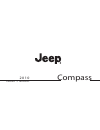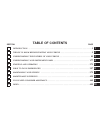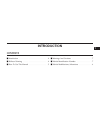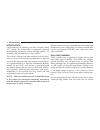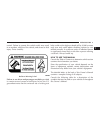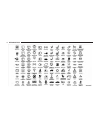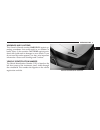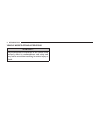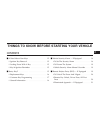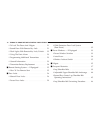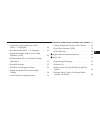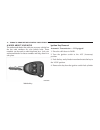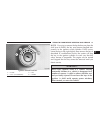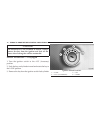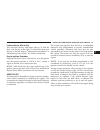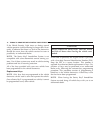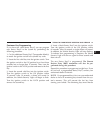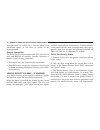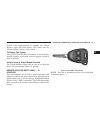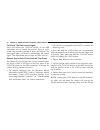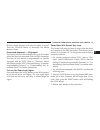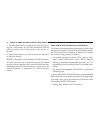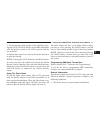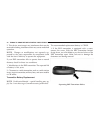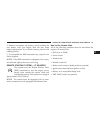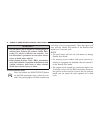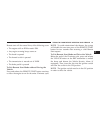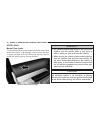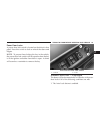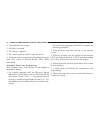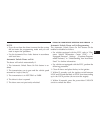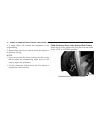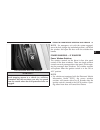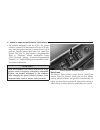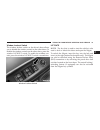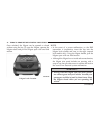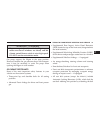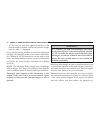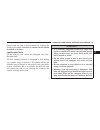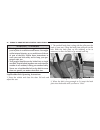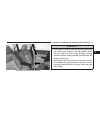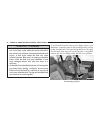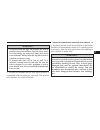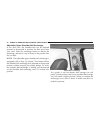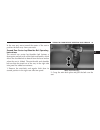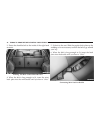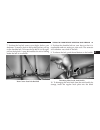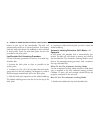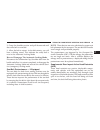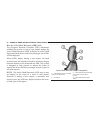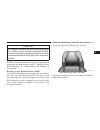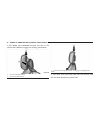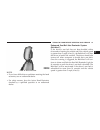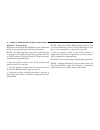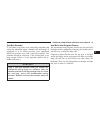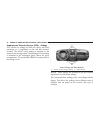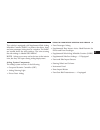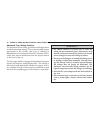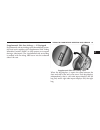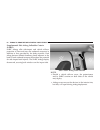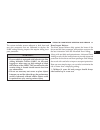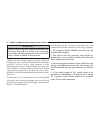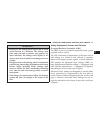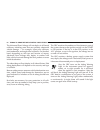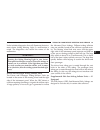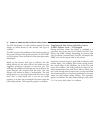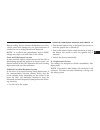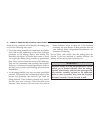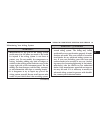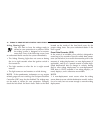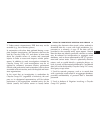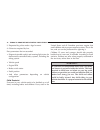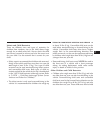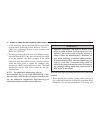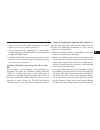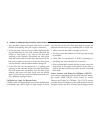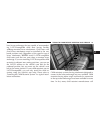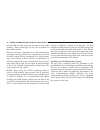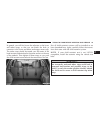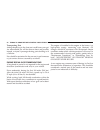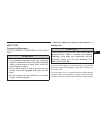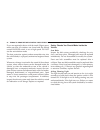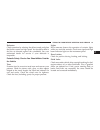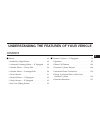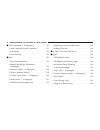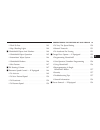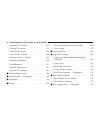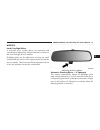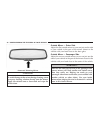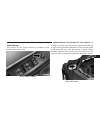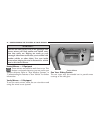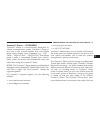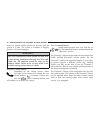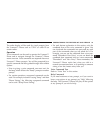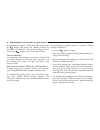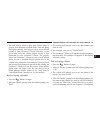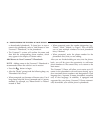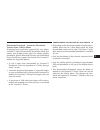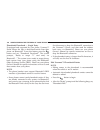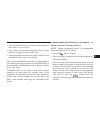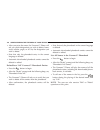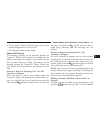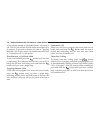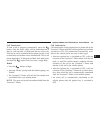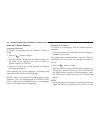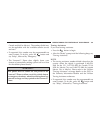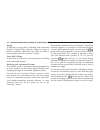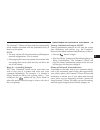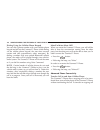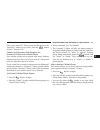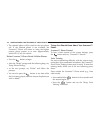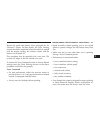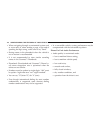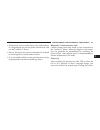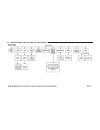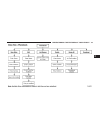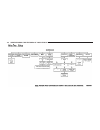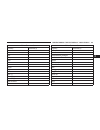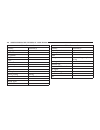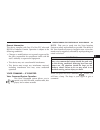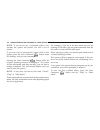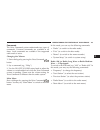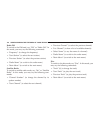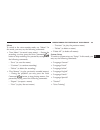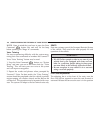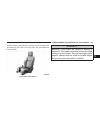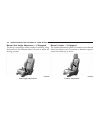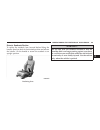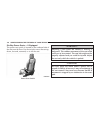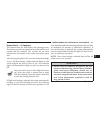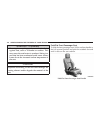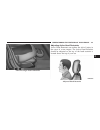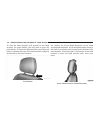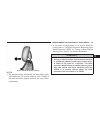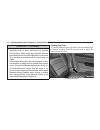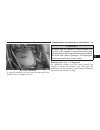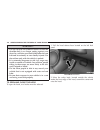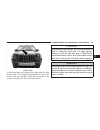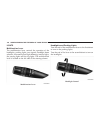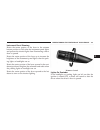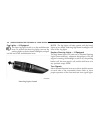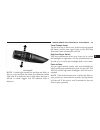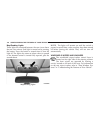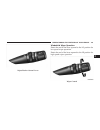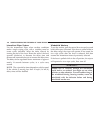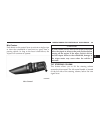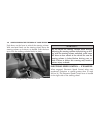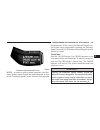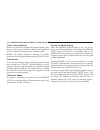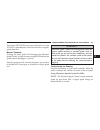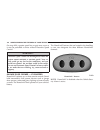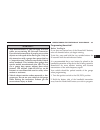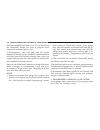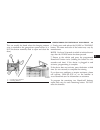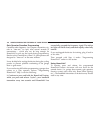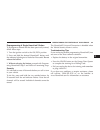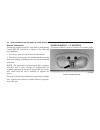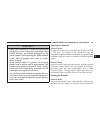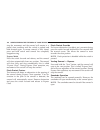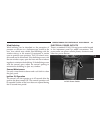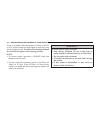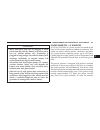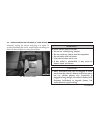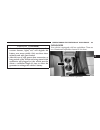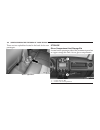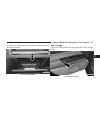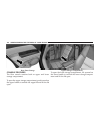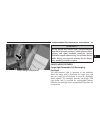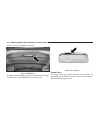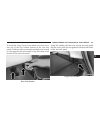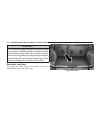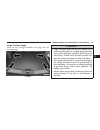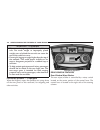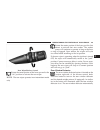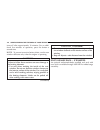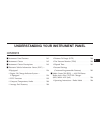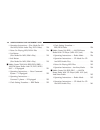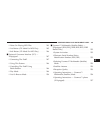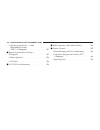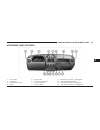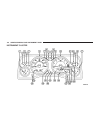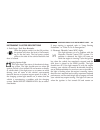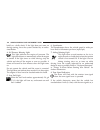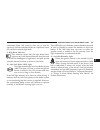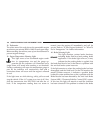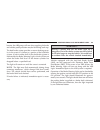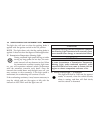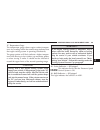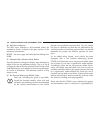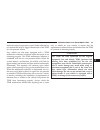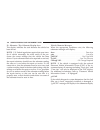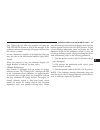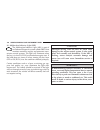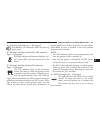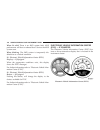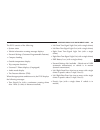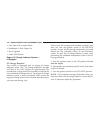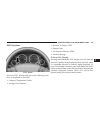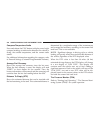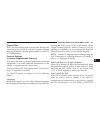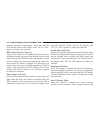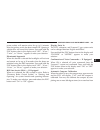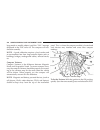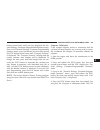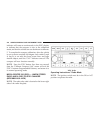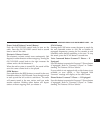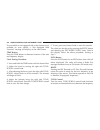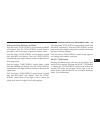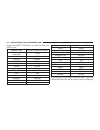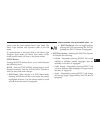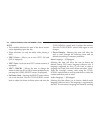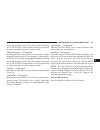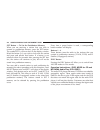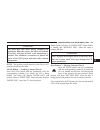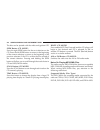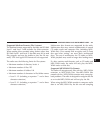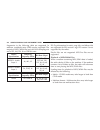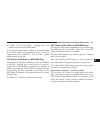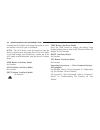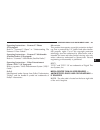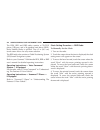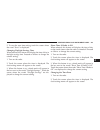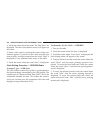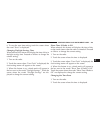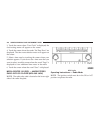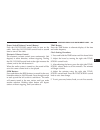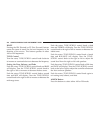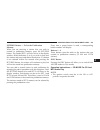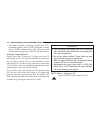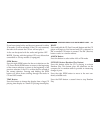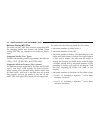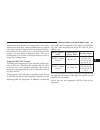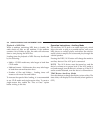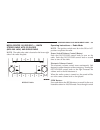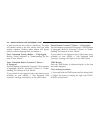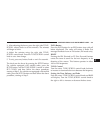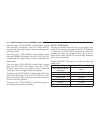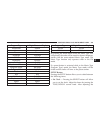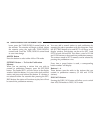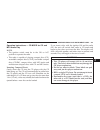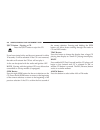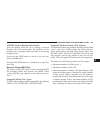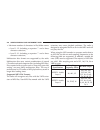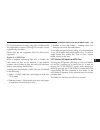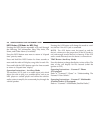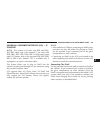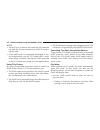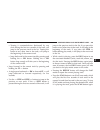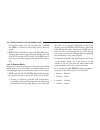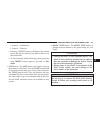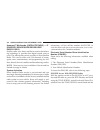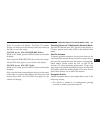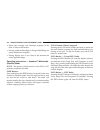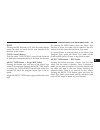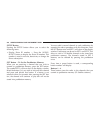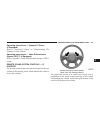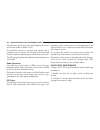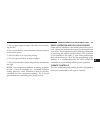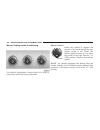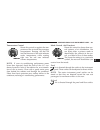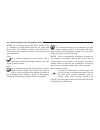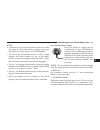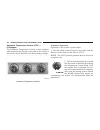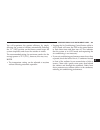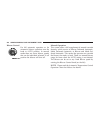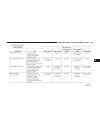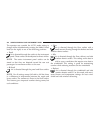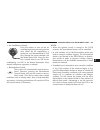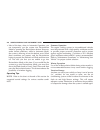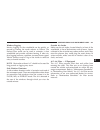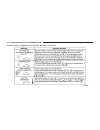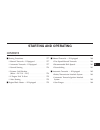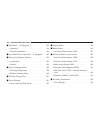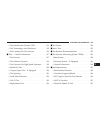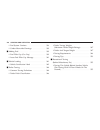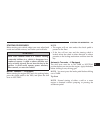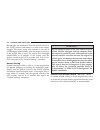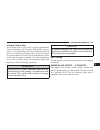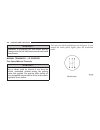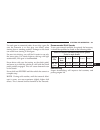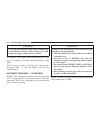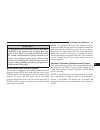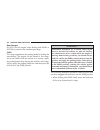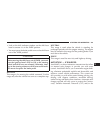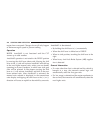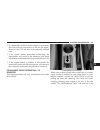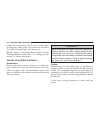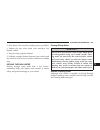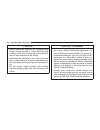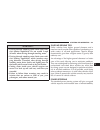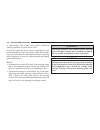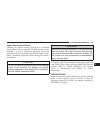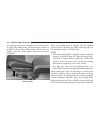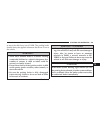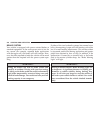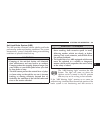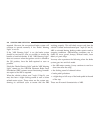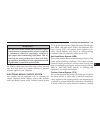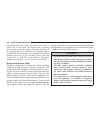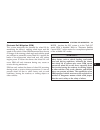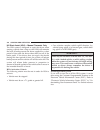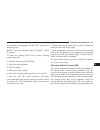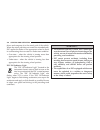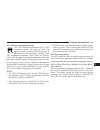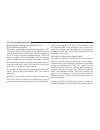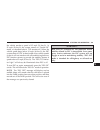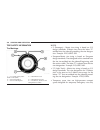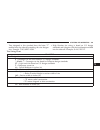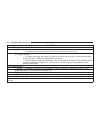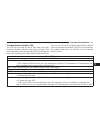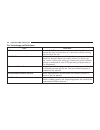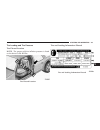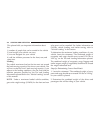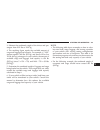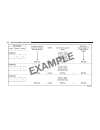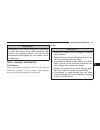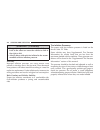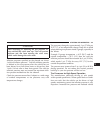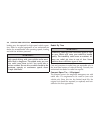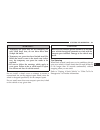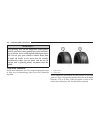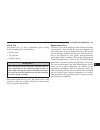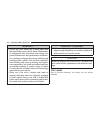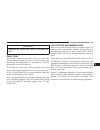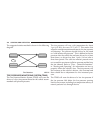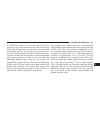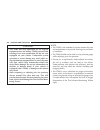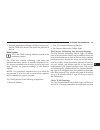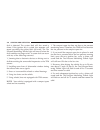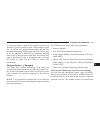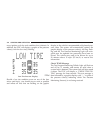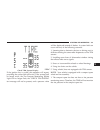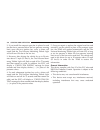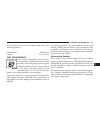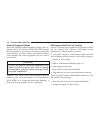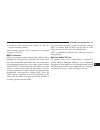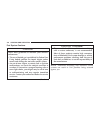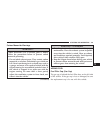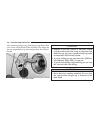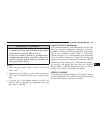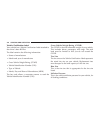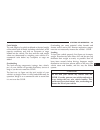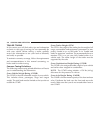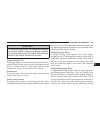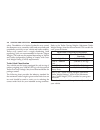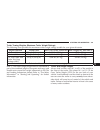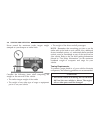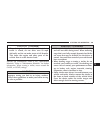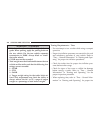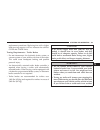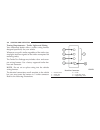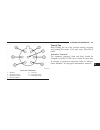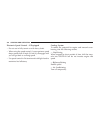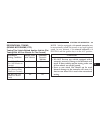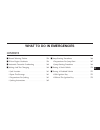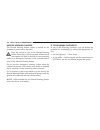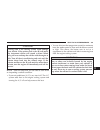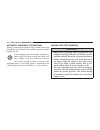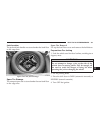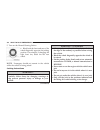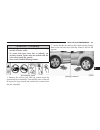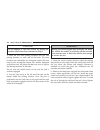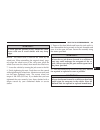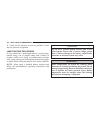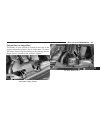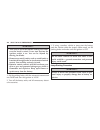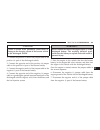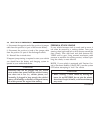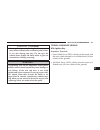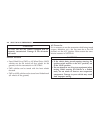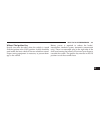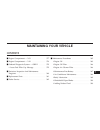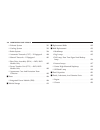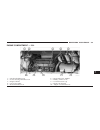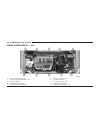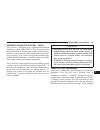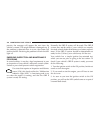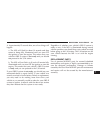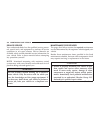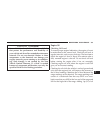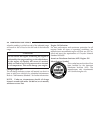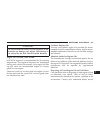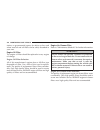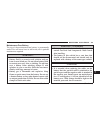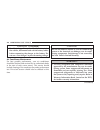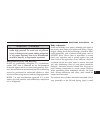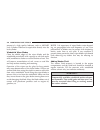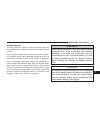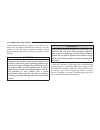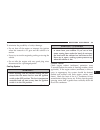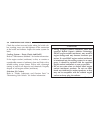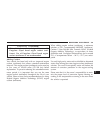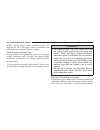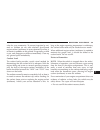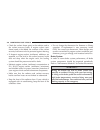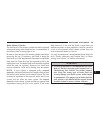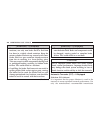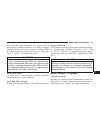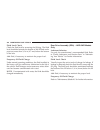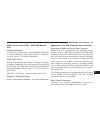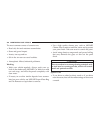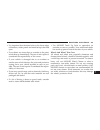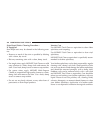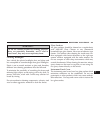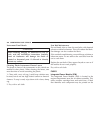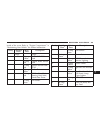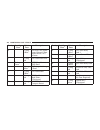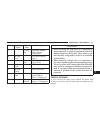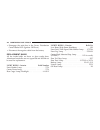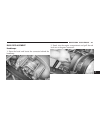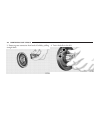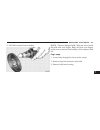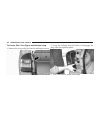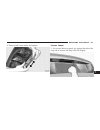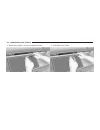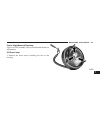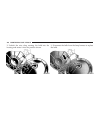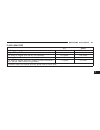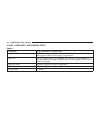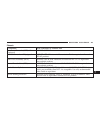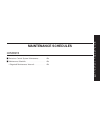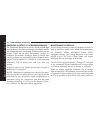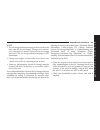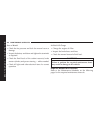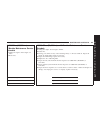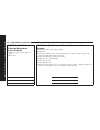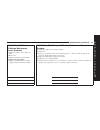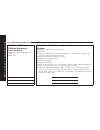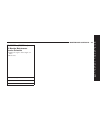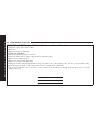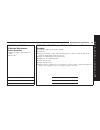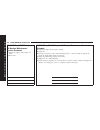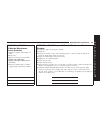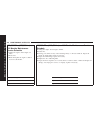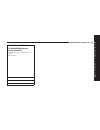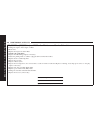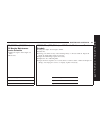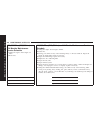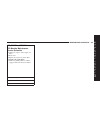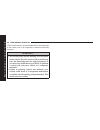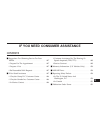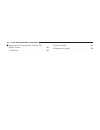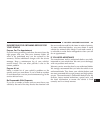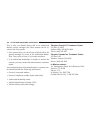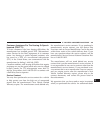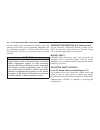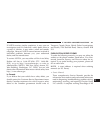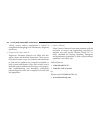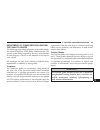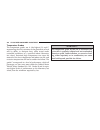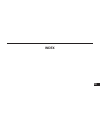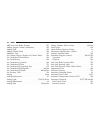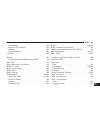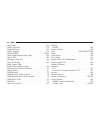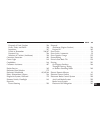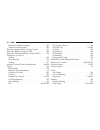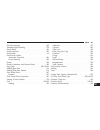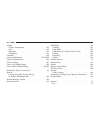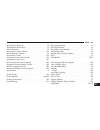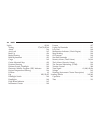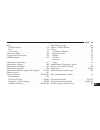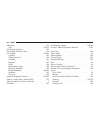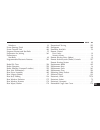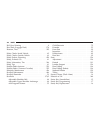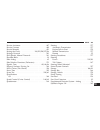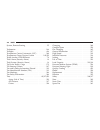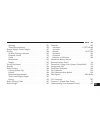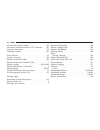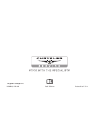- DL manuals
- Jeep
- Automobile
- Compass
- Owner's Manual
Jeep Compass Owner's Manual
Summary of Compass
Page 1
Compass owne r ’ s manual 2 0 1 0
Page 2: Table Of Contents
Table of contents section page 1 introduction . . . . . . . . . . . . . . . . . . . . . . . . . . . . . . . . . . . . . . . . . . . . . . . . . . . . . . . . . . . . 3 2 things to know before starting your vehicle . . . . . . . . . . . . . . . . . . . . . . . . . . . . . .9 3 understanding the featu...
Page 4: Introduction
Introduction contents 䡵 introduction . . . . . . . . . . . . . . . . . . . . . . . . . . . 4 䡵 rollover warning . . . . . . . . . . . . . . . . . . . . . . . 4 䡵 how to use this manual . . . . . . . . . . . . . . . . . . 5 䡵 warnings and cautions . . . . . . . . . . . . . . . . . . . 7 䡵 vehicle ide...
Page 5
Introduction congratulations on selecting your new chrysler group llc vehicle. Be assured that it represents precision workmanship, distinctive styling, and high quality - all essentials that are traditional to our vehicles. This owner’s manual has been prepared with the assis- tance of service and ...
Page 6
Control. Failure to operate this vehicle safely may result in an accident, rollover of the vehicle, and severe or fatal injury. Drive carefully. Failure to use driver and passenger seat belts provided is a major cause of severe or fatal injury. In fact, the u.S. Government notes that the universal u...
Page 7
6 introduction.
Page 8
Warnings and cautions this owner’s manual contains warnings against op- erating procedures that could result in an accident or bodily injury. It also contains cautions against proce- dures that could result in damage to your vehicle. If you do not read this entire manual, you may miss important info...
Page 9
Vehicle modifications/alterations warning! Any modifications or alterations to this vehicle could seriously affect its roadworthiness and safety and may lead to an accident resulting in serious injury or death. 8 introduction.
Page 10: Contents
Things to know before starting your vehicle contents 䡵 a word about your keys . . . . . . . . . . . . . . . . . 12 ▫ ignition key removal . . . . . . . . . . . . . . . . . . 12 ▫ locking doors with a key . . . . . . . . . . . . . . 15 ▫ key-in-ignition reminder . . . . . . . . . . . . . . . 15 䡵 sen...
Page 11
▫ to lock the doors and liftgate . . . . . . . . . . 21 ▫ sound horn with remote key lock . . . . . . . . 21 ▫ flash lights with remote key lock/unlock . . 22 ▫ using the panic alarm . . . . . . . . . . . . . . . . . 23 ▫ programming additional transmitters . . . . . . 23 ▫ general information . . ....
Page 12
▫ automatic locking retractors (alr) mode — if equipped . . . . . . . . . . . . . . . . . . . 48 ▫ seat belt pretensioners — if equipped . . . . . . 49 ▫ supplemental rear impact active head restraints (ahr) . . . . . . . . . . . . . . . . . . . . . . 49 ▫ enhanced seat belt use reminder system (bel...
Page 13
A word about your keys the authorized dealer that sold you your new vehicle has the key code numbers for your vehicle locks. These numbers can be used to order duplicate keys. Ask your authorized dealer for these numbers and keep them in a safe place. Ignition key removal automatic transmission — if...
Page 14
Note: if you try to remove the key before you place the shift lever in park, the key may become trapped tem- porarily in the ignition switch cylinder. If this occurs, rotate the key to the right slightly, then remove the key as described. If a malfunction occurs, the system will trap the key in the ...
Page 15
Caution! An unlocked car is an invitation to thieves. Always remove the key from the ignition and lock all the doors when leaving the vehicle unattended. Manual transmission — if equipped 1. Turn the ignition switch to the acc (accessory) position. 2. Push the key and cylinder inward and rotate the ...
Page 16
Locking doors with a key you can insert the key with either side up. To lock the door, turn the key to the right. To unlock the door, turn the key to the left. Refer to “maintenance procedures” in “maintaining your vehicle” for further information. Key-in-ignition reminder opening the driver’s door ...
Page 17
If the vehicle security light turns on during normal vehicle operation (vehicle running for longer than 10 sec- onds), it indicates that there is a fault in the electronics. Should this occur, have the vehicle serviced as soon as possible by an authorized dealer. Note: the sentry key 威 immobilizer s...
Page 18
Customer key programming if you have two valid sentry keys 威 , you can program new sentry keys 威 to the system by performing the following procedure: 1. Cut the additional sentry key 威 transponder blank(s) to match the ignition switch lock cylinder key code. 2. Insert the first valid key into the ig...
Page 19
Reprogrammed. All vehicle keys must be taken to an authorized dealer at the time of service to be reprogrammed. General information the sentry key 威 system complies with fcc rules part 15 and with rss-210 of industry canada. Operation is subject to the following conditions: • this device may not cau...
Page 20
Disarm. After approximately 16 seconds, the vehicle security light will flash slowly. This shows that the vehicle security alarm is fully armed. To disarm the system press unlock on the rke transmitter, or insert the key into the ignition switch and turn the ignition switch to the on position. Vehic...
Page 21
To unlock the doors and liftgate press and release the unlock button on the rke transmitter once to unlock the driver’s door, or twice within five seconds to unlock all doors and liftgate. The turn signal lights will flash to acknowledge the unlock signal. The illuminated entry system will also turn...
Page 22
Security alarm activated will cause the alarm to sound. Press the unlock button to deactivate the vehicle security alarm. Illuminated approach — if equipped this feature activates the headlights for up to 90 seconds when the doors are unlocked with the rke transmitter. The time for this feature is p...
Page 23
3. Test the feature while outside of the vehicle by press- ing the lock button on the rke transmitter with the ignition switch in the lock position and the key re- moved. 4. Repeat these steps if you want to return this feature to its previous setting. Note: pressing the lock button on the rke trans...
Page 24
3. Test the feature while outside of the vehicle by press- ing the lock/unlock buttons on the rke transmitter with the ignition switch in the lock position and the key removed. 4. Repeat these steps if you want to return this feature to its previous setting. Note: pressing the lock button on the rke...
Page 25
2. This device must accept any interference that may be received including interference that may cause undesired operation. Note: changes or modifications not expressly ap- proved by the party responsible for compliance could void the user’s authority to operate the equipment. If your rke transmitte...
Page 26
2. Remove and replace the battery. Avoid touching the new battery with your fingers. Skin oils may cause battery deterioration. If you touch a battery, clean it with rubbing alcohol. 3. To reassemble the rke transmitter case, snap the two halves together. Note: if the rke transmitter is equipped wit...
Page 27
Warning! • do not start or run an engine in a closed garage or confined area. Exhaust gas contains carbon mon- oxide (co) which is odorless and colorless. Car- bon monoxide is poisonous and can cause serious injury or death when inhaled. • keep remote keyless entry (rke) transmitters away from child...
Page 28
Remote start will also cancel if any of the following occur: • the engine stalls or rpm exceeds 2500 • any engine warning lamps come on • the hood is opened • the hazard switch is pressed • the transmission is moved out of park • the brake pedal is pressed to exit remote start mode without driving t...
Page 29
Door locks manual door locks use the manual door lock plunger to lock the doors from inside the vehicle. If the plunger is down when the door is closed, the door will lock. Make sure the keys are not inside the vehicle before closing the door. Warning! • for personal security and safety in the event...
Page 30
Power door locks a power door lock switch is located on the driver’s door panel. Press this switch to lock or unlock the doors and liftgate. Note: to prevent from locking the key in the vehicle, the power door lock switch will not operate when the key is in the ignition and either front door is open...
Page 31
2. The transmission is in gear. 3. All doors are closed. 4. The throttle is pressed. 5. The vehicle speed is above 15 mph (24 km/h). 6. The doors were not previously locked using the power door lock switch or remote keyless entry (rke) transmitter. Automatic door locks programming the automatic door...
Page 32
Note: • if you do not hear the chime it means that the system did not enter the programming mode and you will need to repeat the procedure. • use the automatic door locks feature in accordance with local laws. Automatic unlock doors on exit the doors will unlock automatically if: 1. The automatic un...
Page 33
4. A single chime will indicate the completion of the programming. 5. Repeat these steps if you want to return this feature to its previous setting. Note: • if you do not hear the chime it means that the system did not enter the programming mode and you will need to repeat the procedure. • use the a...
Page 34
Warning! Avoid trapping anyone in a vehicle in a collision. Remember that the rear doors can only be opened from the outside when the child protection locks are engaged. Note: for emergency exit with the system engaged, move the lock plunger up (unlocked position), roll down the window and open the ...
Page 35
• for vehicles equipped with the evic, the power window switches will remain active for up to 10 min- utes after the ignition switch is turned to the lock position. Opening either front door will cancel this feature. The time for this feature is programmable. Refer to “electronic vehicle information...
Page 36
Window lockout switch the window lockout switch on the driver’s door allows you to disable the window control on the other doors. To disable the window controls on the other doors, press the window lockout switch. To enable the window con- trols, press the window lockout switch a second time. Liftga...
Page 37
Once unlocked, the liftgate can be opened or closed without using the key. To open the liftgate, squeeze the liftgate release and pull the liftgate open with one fluid motion. Note: • in the event of a power malfunction, or the rke transmitter is inoperative, insert the key into the liftgate lock cy...
Page 38
Warning! (continued) • if you are required to drive with the liftgate open, make sure that all windows are closed, and the climate control blower switch is set at high speed. Do not use the recirculation mode. Gas props support the liftgate in the open position. However, because the gas pressure dro...
Page 39
All the way out and then adjusting the belt to the desired length to restrain a child seat or secure a large item in a seat — if equipped if you will be carrying children too small for adult-sized seat belts, the seat belts or the lower anchors and tether for children (latch) feature also can be use...
Page 40
Ejection and the risk of injury caused by striking the inside of the vehicle. Everyone in a motor vehicle should be belted at all times. Lap/shoulder belts all the seats in your vehicle are equipped with lap/ shoulder belts. The belt webbing retractor is designed to lock during very sudden stops or ...
Page 41
Warning! (continued) • wearing your belt in the wrong place could make your injuries in a collision much worse. You might suffer internal injuries, or you could even slide out of part of the belt. Follow these instructions to wear your seat belt safely and to keep your pas- sengers safe, too. • two ...
Page 42
Warning! • a belt that is buckled into the wrong buckle will not protect you properly. The lap portion could ride too high on your body, possibly causing internal injuries. Always buckle your belt into the buckle nearest you. • a belt that is too loose will not protect you as well. In a sudden stop ...
Page 43
Warning! (continued) • a belt that is worn under your arm is very danger- ous. Your body could strike the inside surfaces of the vehicle in a collision, increasing head and neck injury. A belt worn under the arm can cause internal injuries. Ribs aren’t as strong as shoulder bones. Wear the belt over...
Page 44
Warning! • a lap belt worn too high can increase the risk of internal injury in a collision. The belt forces won’t be at the strong hip and pelvic bones, but across your abdomen. Always wear the lap belt as low as possible and keep it snug. • a twisted belt can’t do its job as well. In a collision, ...
Page 45
Adjustable upper shoulder belt anchorage in the front seat, the shoulder belt can be adjusted upward or downward to position the belt away from your neck. Push the anchorage button to release the anchorage, and move it up or down to the position that fits you best. Note: the adjustable upper shoulde...
Page 46
In the rear seat, move toward the center of the seat to position the belt away from your neck. Second row center lap/shoulder belt operating instructions the second row center lap/shoulder belt features a three-point seat belt with a mini-latch and buckle, which allows the shoulder belt to detach fr...
Page 47
3. Route the shoulder belt to the inside of the right head restraint. 4. When the belt is long enough to fit, insert the mini- latch plate into the mini-buckle until you hear a “click.” 5. Sit back in the seat. Slide the regular latch plate up the webbing as far as necessary to allow the belt to go ...
Page 48
7. Position the lap belt across your thighs, below your abdomen. To remove slack in the lap belt portion, pull up on the shoulder belt. To loosen the lap belt if it is too tight, pull on the lap belt. A snug belt reduces the risk of sliding under the belt in a collision. 8. Position the shoulder bel...
Page 49
Button on the top of the mini-buckle. The belt will automatically retract to its stowed position. If necessary, slide the latch plate down the webbing to allow the belt to retract fully. Insert the mini-latch plate into the slot provided in the trim panel. Lap/shoulder belt untwisting procedure use ...
Page 50
2. Grasp the shoulder portion and pull downward until the entire belt is extracted. 3. Allow the belt to retract. As the belt retracts, you will hear a clicking sound. This indicates the safety belt is now in the automatic locking mode. How to disengage the automatic locking mode disconnect the comb...
Page 51
How the active head restraints (ahr) work the occupant restraint controller (orc) determines whether the severity or type of rear impact require the active head restraints (ahr) to deploy. In case of ahr deployment both driver and front passenger seat ahr’s will be deployed. When ahr’s deploy during...
Page 52
Caution! All occupants, including the driver, should not oper- ate a vehicle or sit in a vehicle’s seat until the head restraints are placed in their proper positions in order to minimize the risk of neck injury in the event of an accident. Note: for more information on properly adjusting and positi...
Page 53
3. Pull down then rearward towards the rear of the vehicle then down to engage the locking mechanism. 4. The ahr front soft foam and trim half should lock into the back decorative plastic half. 1 — downward movement 2 — rearward movement 3 — final downward movement to engage locking mecha- nism 52 t...
Page 54
Note: • if you have difficulties or problems resetting the head restraints, see an authorized dealer. • for safety reasons, have the active head restraints checked by a qualified specialist at an authorized dealer. Enhanced seat belt use reminder system (beltalert 姞 ) if the driver’s seat belt has n...
Page 55
Beltalert 威 programming beltalert 威 can be enabled or disabled by your authorized dealer or by performing the following procedure: note: the following steps must occur within the first 60 seconds of the ignition switch being turned to the on or start position. Chrysler group llc does not recom- mend...
Page 56
Seat belt extender if a seat belt is too short, even when fully extended, and when the adjustable upper shoulder belt anchorage (if equipped) is in its lowest position, your authorized dealer can provide you with a seat belt extender. This extender should be used only if the existing belt is not lon...
Page 57
Supplemental restraint system (srs) - airbags this vehicle has airbags for both the driver and front passenger as a supplement to the seat belt restraint systems. The driver’s front airbag is mounted in the center of the steering wheel. The passenger’s front airbag is mounted in the instrument panel...
Page 58
This vehicle is equipped with supplemental side airbag inflatable curtains (sabic) to protect the driver, front, and rear passengers sitting next to a window. The sabic are located above the side windows. The trim covering the side airbags is labeled srs airbag. Note: airbag covers may not be obviou...
Page 59
Advanced front airbag features the advanced front airbag system has multistage driver and front passenger airbags. This system provides output appropriate to the severity and type of collision as determined by the occupant restraint controller (orc), which may receive information from the impact sen...
Page 60
Supplemental side seat airbags — if equipped supplemental side seat airbags provide enhanced protec- tion and work together with supplemental side airbag inflatable curtains (sabic) to help protect an occupant during a side impact. The supplemental side seat airbag is marked with an airbag label sew...
Page 61
Supplemental side airbag inflatable curtain (sabic) sabic airbags offer side-impact and vehicle rollover protection to front and rear seat outboard occupants in addition to that provided by the body structure. Each airbag features inflated chambers placed adjacent to the head of each outboard occupa...
Page 62
The system includes sensors adjacent to both front and rear seat occupants that are calibrated to deploy the sabic airbags during impacts that require airbag occu- pant protection. Warning! • if your vehicle is equipped with left and right side airbag inflatable curtain (sabic), do not stack luggage...
Page 63
Warning! Infants in rear facing child restraints should never ride in the front seat of a vehicle with a passenger front airbag. An airbag deployment can cause severe injury or death to infants in that position. Children that are not big enough to wear the vehicle seat belt properly (see section on ...
Page 64
Warning! • relying on the airbags alone could lead to more severe injuries in a collision. The airbags work with your seat belt to restrain you properly. In some collisions, the airbags won’t deploy at all. Always wear your seat belts even though you have airbags. • being too close to the steering w...
Page 65
The advanced front airbags will not deploy in all frontal collisions, including some that may produce substantial vehicle damage — for example, some pole collisions, truck underrides, and angle offset collisions. On the other hand, depending on the type and location of impact, advanced front airbags...
Page 66
It also includes diagnostics that will illuminate the instru- ment cluster airbag warning light if a malfunction is noted. The diagnostics also record the nature of the malfunction. Warning! Ignoring the airbag warning light in your instru- ment panel could mean you won’t have the airbags to protect...
Page 67
The orc determines if a side collision requires the side airbags to inflate based on the severity and type of collision. The orc monitors the readiness of the electronic parts of the system whenever the ignition switch is in the start or on positions. These include all of the items previously mentio...
Page 68
Because airbag sensors estimate deceleration over time, vehicle speed and damage are not good indicators of whether or not an airbag should have deployed. Note: in a rollover the pretensioners and/or sabic airbags may deploy on both sides of the vehicle. Front and side impact sensors in front and si...
Page 69
If you do have a collision, which deploys the airbags, any or all of the following may occur: • the nylon airbag material may sometimes cause abra- sions and/or skin reddening to the driver and front passenger as the airbags deploy and unfold. The abrasions are similar to friction rope burns or thos...
Page 70
Maintaining your airbag system warning! • modifications to any part of the airbag system could cause it to fail when you need it. You could be injured if the airbag system is not there to protect you. Do not modify the components or wiring, including adding any kind of badges or stickers to the stee...
Page 71
Airbag warning light you will want to have the airbags ready to inflate for your protection in a collision. While the airbag system is designed to be mainte- nance free, if any of the following occurs, have an authorized dealer service the system immediately. • the airbag warning light does not come...
Page 72
2. Under certain circumstances, edr data may not be recorded (e.G., loss of battery power). In conjunction with other data gathered during a com- plete accident investigation, the electronic data may be used by chrysler group llc and others to learn more about the possible causes of crashes and asso...
Page 73
3. Requested by police under a legal warrant. 4. Otherwise required by law. Data parameters that are recorded: • diagnostic trouble code(s) and warning light status for electronically-controlled safety systems, including the airbag system • vehicle speed • engine rpm • brake switch status • pedal po...
Page 74
Infants and child restraints there are different sizes and types of restraints for children from newborn size to the child almost large enough for an adult safety belt. Always check the child seat owner’s manual to ensure you have the correct seat for your child. Use the restraint that is correct fo...
Page 75
In the vehicle by the lap/shoulder belt or the latch child restraint anchorage system. Refer to ⬙ latch — child seat anchorage system (lower anchors and tether for children) ⬙ . • the belt-positioning booster seat is for children weigh- ing more than 40 lbs (18 kg), but who are still too small to fi...
Page 76
That you can install the child restraint in the vehicle where you will use it, before you buy it. • the restraint must be appropriate for your child’s weight and height. Check the label on the restraint for weight and height limits. • carefully follow the instructions that come with the restraint. I...
Page 77
Any seat belt system will loosen with time, so check the belt occasionally, and pull it tight if necessary. • in the rear seat, you may have trouble tightening the lap/shoulder belt on the child restraint because the buckle or latch plate is too close to the belt path opening on the restraint. Disco...
Page 78
Have lower anchorages that are capable of accommodat- ing latch-compatible child seats having flexible, webbing-mounted lower attachments. Child seats with fixed lower attachments must be installed in the out- board positions only. Regardless of the specific type of lower attachment, never install l...
Page 79
Provide add-on tether strap kits for some of their older products. Tether anchorage kits are also available for most older vehicles. Because the lower anchorages are to be introduced to passenger carrying vehicles over a period of years, child restraint systems having attachments for those anchor- a...
Page 80
In general, you will first loosen the adjusters on the lower and tether straps so that you can attach the hook or connector to the lower and tether anchorages more easily. The tether strap should be routed over the center of the head restraint and attached to the tether anchor on the rear of the sea...
Page 81
Transporting pets airbags deploying in the front seat could harm your pet. An unrestrained pet will be thrown about and possibly injured, or injure a passenger during panic braking or in a collision. Pets should be restrained in the rear seat in pet harnesses or pet carriers that are secured by seat...
Page 82
Safety tips transporting passengers never transport passengers in the cargo area. Warning! • it is extremely dangerous to ride in a cargo area, inside or outside of a vehicle. In a collision, people riding in these areas are more likely to be seri- ously injured or killed. • do not allow people to r...
Page 83
If you are required to drive with the trunk/liftgate open, make sure that all windows are closed and the climate control blower switch is set at high speed. Do not use the recirculation mode. The best protection against carbon monoxide entry into the vehicle body is a properly maintained engine exha...
Page 84
Defroster check operation by selecting the defrost mode and place the blower control on high speed. You should be able to feel the air directed against the windshield. See your authorized dealer for service if your defroster is inoperable. Periodic safety checks you should make outside the vehicle t...
Page 86: Contents
Understanding the features of your vehicle contents 䡵 mirrors . . . . . . . . . . . . . . . . . . . . . . . . . . . . . . 89 ▫ inside day/night mirror . . . . . . . . . . . . . . . . 89 ▫ automatic dimming mirror — if equipped . . . 89 ▫ outside mirror — driver side . . . . . . . . . . . . 90 ▫ outs...
Page 87
䡵 voice command — if equipped . . . . . . . . . . . 121 ▫ voice command system operation . . . . . . . . 121 ▫ commands . . . . . . . . . . . . . . . . . . . . . . . . 123 ▫ voice training . . . . . . . . . . . . . . . . . . . . . . 126 䡵 seats . . . . . . . . . . . . . . . . . . . . . . . . . . . ....
Page 88
▫ flash-to-pass . . . . . . . . . . . . . . . . . . . . . . . 143 ▫ map/reading lights . . . . . . . . . . . . . . . . . . 144 䡵 windshield wipers and washers . . . . . . . . . . 144 ▫ windshield wiper operation . . . . . . . . . . . . 145 ▫ intermittent wiper system . . . . . . . . . . . . . . 146 ...
Page 89
▫ opening the sunroof . . . . . . . . . . . . . . . . . 159 ▫ closing the sunroof . . . . . . . . . . . . . . . . . . 159 ▫ pinch protect feature . . . . . . . . . . . . . . . . . 160 ▫ pinch protect override . . . . . . . . . . . . . . . . 160 ▫ venting sunroof — express . . . . . . . . . . . . . 1...
Page 90
Mirrors inside day/night mirror a two-point pivot system allows for horizontal and vertical mirror adjustment. Adjust the mirror to center on the view through the rear window. Headlight glare can be reduced by moving the small control under the mirror to the night position (toward the rear of vehicl...
Page 91
Caution! To avoid damage to the mirror during cleaning, never spray any cleaning solution directly onto the mirror. Apply the solution onto a clean cloth and wipe the mirror clean. Outside mirror — driver side adjust the flat outside mirror so you can just see the side of your vehicle in the part of...
Page 92
Power mirrors the control for the power mirrors is located on the driver’s door trim panel. To adjust a mirror, turn the control wand toward the left or right mirror positions indicated. Tilt the control wand in the direction you want the mirror to move. When finished adjusting the mirror, turn the ...
Page 93
Warning! Vehicles and other objects seen in the passenger side convex mirror will look smaller and farther away than they really are. Relying too much on your passenger side mirror could cause you to collide with another vehicle or other object. Use your inside mirror when judging the size or distan...
Page 94
Uconnect™ phone — if equipped uconnect™ phone is a voice-activated, hands-free, in- vehicle communications system. Uconnect™ phone al- lows you to dial a phone number with your cellular phone using simple voice commands (e.G., ⬙ call” ѧ “mike” ѧ ”work ⬙ or ⬙ dial” ѧ “248-555-1212 ⬙ ). Your cellular ...
Page 95
Linked (or paired) cellular phone can be used with the system at a time. The system is available in english, spanish, or french languages. Warning! Any voice commanded system should be used only in safe driving conditions following local laws and phone use. All attention should be kept on the roadwa...
Page 96
The radio display will be used for visual prompts from the uconnect™ phone such as ⬙ cell ⬙ or caller id on certain radios. Operation voice commands can be used to operate the uconnect™ phone and to navigate through the uconnect™ phone menu structure. Voice commands are required after most uconnect™...
Page 97
To activate the uconnect™ phone from idle, simply press the button and follow the audible prompts for directions. All uconnect™ phone sessions begin with a press of the button on the radio control head. Cancel command at any prompt, after the beep, you can say ⬙ cancel ⬙ and you will be returned to ...
Page 98
• you will then be asked to give your cellular phone a priority level between one and seven, with one being the highest priority. You can pair up to seven cellular phones to your uconnect™ phone. However, at any given time, only one cellular phone can be in use, connected to your uconnect™ phone. Th...
Page 99
Or downloaded phonebook. To learn how to store a name in the phonebook, refer to ⬙ add names to your uconnect™ phonebook, ⬙ in the phonebook. • the uconnect™ system will confirm the name and then dial the corresponding phone number, which may appear in the display of certain radios. Add names to you...
Page 100
Phonebook download – automatic phonebook transfer from cellular phone if equipped and specifically supported by your phone, uconnect™ phone automatically downloads names (text names) and number entries from the cellular phone’s phonebook. Specific bluetooth 威 phones with phone book access profile ma...
Page 101
Phonebook download — single entry if equipped and supported by your phone, uconnect™ phone allows the user to download entries from their phone via bluetooth 威 . To use this feature, press the button and say “phonebook download.” the system prompts, “ready to accept “v” card entry via bluetooth 威 …”...
Page 102
• you will then be asked for the name of the phonebook entry that you wish to edit. • next, choose the number designation (home, work, cellular, or pager) that you wish to edit. • when prompted, recite the new phone number for the phonebook entry that you are editing. After you are finished editing ...
Page 103
• after you enter the name, the uconnect™ phone will ask you which designation you wish to delete: home, work, cellular, pager, or all. Say the designation you wish to delete. • note that only the phonebook entry in the current language is deleted. • automatic downloaded phonebook entries cannot be ...
Page 104
• the uconnect™ phone will then prompt you as to the number designation you wish to call. • the selected number will be dialed. Phone call features the following features can be accessed through the uconnect™ phone if the feature(s) are available on your cellular service plan. For example, if your c...
Page 105
By the phone number or phonebook entry you wish to call. The first call will be on hold while the second call is in progress. To go back to the first call, refer to ⬙ toggling between calls ⬙ in this section. To combine two calls, refer to ⬙ conference call ⬙ in this section. Place/retrieve a call f...
Page 106
Call termination to end a call in progress, momentarily press the button. Only the active call(s) will be terminated and if there is a call on hold, it will become the new active call. If the active call is terminated by the phone far end, a call on hold may not become active automatically. This is ...
Page 107
Uconnect™ phone features language selection to change the language that the uconnect™ phone is using: • press the button to begin. • after the ⬙ ready ⬙ prompt and the following beep, say the name of the language you wish to switch to english, espanol, or francais. • continue to follow the system pr...
Page 108
Canada and 060 for mexico). The number dialed may not be applicable with the available cellular service and area. • if supported, this number may be programmable on some systems. To do this, press the button and say ‘setup’, followed by ‘emergency’. • the uconnect™ phone does slightly lower your cha...
Page 109
Paging to learn how to page, refer to ⬙ working with automated systems. ⬙ paging works properly except for pagers of certain companies, which time out a little too soon to work properly with the uconnect™ phone. Voice mail calling to learn how to access your voice mail, refer to ⬙ working with autom...
Page 110
The uconnect™ phone will then send the corresponding phone number associated with the phonebook entry, as tones over the phone. Note: • you may not hear all of the tones due to cellular phone network configurations. This is normal. • some paging and voice mail systems have system time out settings t...
Page 111
Dialing using the cellular phone keypad you can dial a phone number with your cellular phone keypad and still use the uconnect™ phone (while dialing via the cellular phone keypad, the user must exercise caution and take precautionary safety measures). By dialing a number with your paired bluetooth 威...
Page 112
From your uconnect™ phone paired cellular phone to the uconnect™ phone or vice versa, press the button and say ⬙ transfer call. ⬙ connect or disconnect link between the uconnect™ phone and cellular phone your cellular phone can be paired with many different electronic devices, but can only be active...
Page 113
• the selected phone will be used for the next phone call. If the selected phone is not available, the uconnect™ phone will return to using the highest priority phone present in or near (approximately within 30 ft (9 m)) the vehicle. Delete uconnect™ phone paired cellular phones • press the button t...
Page 114
Repeat the words and phrases when prompted by the uconnect™ phone. For best results, the voice training session should be completed when the vehicle is parked with the engine running, all windows closed, and the blower fan switched off. This procedure may be repeated with a new user. The system will...
Page 115
• when navigating through an automated system such as voice mail, or when sending a page, at the end of speaking the digit string, make sure to say ⬙ send. ⬙ • storing names in the phonebook when the vehicle is not in motion is recommended. • it is not recommended to store similar sounding names in ...
Page 116
• performance, such as audio clarity, echo, and loudness to a large degree rely on the phone and network, and not the uconnect™ phone. • echo at the phone far end can sometimes be reduced by lowering the in-vehicle audio volume. • in a convertible vehicle, system performance may be compromised with ...
Page 117
116 understanding the features of your vehicle.
Page 118
3 understanding the features of your vehicle 117.
Page 119
118 understanding the features of your vehicle.
Page 120
Voice commands primary alternate(s) zero one two three four five six seven eight nine star (*) plus (+) pound (#) add location all voice commands primary alternate(s) call cancel confirmation prompts continue delete dial download edit emergency english erase all espanol francais help home 3 understa...
Page 121
Voice commands primary alternate(s) language list names list phones mobile mute mute off new entry no pager pair a phone phone pairing pairing phonebook phone book previous record again redial voice commands primary alternate(s) return to main menu return or main menu select phone select send set up...
Page 122
General information this device complies with part 15 of the fcc rules and rss 210 of industry canada. Operation is subject to the following conditions: • changes or modifications not expressly approved by the party responsible for compliance could void the user’s authority to operate the equipment....
Page 123
Note: if you do not say a command within a few seconds, the system will present you with a list of options. If you ever wish to interrupt the system while it lists options, press the voice command button, listen for the beep, and say your command. Pressing the voice command button while the system i...
Page 124
Commands the voice command system understands two types of commands. Universal commands are available at all times. Local commands are available if the supported radio mode is active. Changing the volume 1. Start a dialogue by pressing the voice command button. 2. Say a command (e.G., “help”). 3. Us...
Page 125
Radio fm to switch to the fm band, say “fm” or “radio fm”. In this mode, you may say the following commands: • “frequency” (to change the frequency) • “next station” (to select the next station) • “previous station” (to select the previous station) • “radio menu” (to switch to the radio menu) • “mai...
Page 126
Memo to switch to the voice recorder mode, say “memo”. In this mode, you may say the following commands: • “new memo” (to record a new memo) — during the recording, you may press the voice command button to stop recording. You proceed by saying one of the following commands: − “save” (to save the me...
Page 127
Note: keep in mind that you have to press the voice command button first and wait for the beep before speaking the “barge in” commands. Voice training for users experiencing difficulty with the system recog- nizing their voice commands or numbers the uconnect™ voice “voice training” feature may be u...
Page 128
Desired. Then, using body pressure, move forward and rearward on the seat to be sure that the seat adjusters have latched. Warning! Adjusting a seat while the vehicle is moving is dangerous. The sudden movement of the seat could cause you to lose control. The seat belt might not be properly adjusted...
Page 129
Manual seat height adjustment — if equipped the driver’s seat height can be raised or lowered by using the handle on the outboard side of the seat to adjust the driving position. Manual lumbar — if equipped the lumbar adjustment handle is located on the outboard side of the driver’s seat. To increas...
Page 130
Driver’s seatback recline to recline the seatback, lean forward before lifting the handle, then lean back to the desired position and release the handle. Lift the handle to return the seatback to an upright position. Warning! Do not ride with the seatback reclined so that the shoulder belt is no lon...
Page 131
Six-way power seats — if equipped the power seat switch is located on the outboard side of the seat near the floor. Use the switch to move the seat up, down, forward, rearward, or to tilt the seat. Warning! Adjusting a seat while the vehicle is moving is dangerous. The sudden movement of the seat co...
Page 132
Heated seats — if equipped this feature heats the front driver and passenger seats. The heaters provide the same heat level for both the seat cushion and the seatback. The controls for the front heated seats are located on the center instrument panel area. After turning the ignition on, you can choo...
Page 133
Warning! (continued) • do not place anything on the seat that insulates against heat, such as a blanket or cushion. This may cause the seat heater to overheat. Sitting in a seat that has been overheated could cause serious burns due to the increased surface temperature of the seat. Caution! Repeated...
Page 134
Adjusting active head restraints active head restraints can reduce the risk of injury in the event of a rear impact. The active head restraint should be adjusted so the top of the head restraint is located above the top of your ear. Front passenger seat folded flat adjusted head restraint 3 understa...
Page 135
To raise the head restraint, pull upward on the head restraint (on some models, you may need to press the push button). To lower the head restraint, press the push button, located at the base of the head restraint, and push downward on the head restraint. For comfort the active head restraints can b...
Page 136
Note: • the head restraints should only be removed by quali- fied technicians, for service purposes only. If either of the head restraints require removal, see your autho- rized dealer. • in the event of deployment of an active head re- straint, refer to “occupant restraints/resetting active head re...
Page 137
Warning! (continued) • do not place items over the top of the active head restraint, such as coats, seat covers or portable dvd players. These items may interfere with the operation of the active head restraint in the event of an accident and could result in serious injury or death. • active head re...
Page 138
To raise the seatback, pull the strap forward and lift the seatback into its upright position. Warning! Be certain that the seatback is securely locked into position. If the seatback is not securely locked into position the seat will not provide the proper stability for child seats and/or passengers...
Page 139
Warning! • do not ride with the seatback reclined so that the shoulder belt is no longer resting against your chest. In a collision you could slide under the seat belt and be seriously or even fatally injured. Use the recliner only with the vehicle is parked. • it is extremely dangerous to ride in a...
Page 140
Lift the hood prop rod, clipped to the right side (left side facing hood) of the engine compartment to secure the hood in the open position. Place the hood prop at the location stamped into the inner hood surface. Caution! To prevent possible damage, do not slam the hood to close it. Lower the hood ...
Page 141
Lights multifunction lever the multifunction lever controls the operation of the headlights, parking lights, turn signals, headlight beam selection, instrument panel light dimming, interior lights, the passing lights and the fog lights. The multifunction lever is located on the left side of the stee...
Page 142
Instrument panel dimming rotate the center portion of the lever to the extreme bottom position to fully dim the instrument panel lights and prevent the interior lights from illuminating when a door is opened. Rotate the center portion of the lever up to increase the brightness of the instrument pane...
Page 143
Fog lights — if equipped the front fog light switch is on the multifunction lever. To activate the front fog lights, turn on the parking lights or the low beam headlights and pull out the end of the multifunction lever. Note: the fog lights will only operate with the head- lights on low beam. Select...
Page 144
Note: if either light remains on and does not flash, or there is a very fast flash rate, check for a defective outside light bulb. If an indicator fails to light when the lever is moved, it would suggest that the indicator bulb is defective. Lane change assist tap the lever up or down once, without ...
Page 145
Map/reading lights these lights are mounted between the sun visors above the rear view mirror. Each light is turned on by pressing the button. Press the button a second time to turn the light off. The lights also come on when a door is opened or the dimmer control is turned fully upward, past the se...
Page 146
Windshield wiper operation rotate the end of the lever upward to the lo position for low-speed wiper operation. Rotate the end of the lever upward to the hi position for high-speed wiper operation. Wiper/washer control lever wiper control 3 understanding the features of your vehicle 145.
Page 147
Intermittent wiper system use the intermittent wiper when weather conditions make a single wiping cycle, with a variable pause be- tween cycles, desirable. Select the delay interval by turning the end of the lever. Rotate the end of the lever upward (clockwise) to decrease the delay time and downwar...
Page 148
Mist feature push down on the control lever to activate a single wipe to clear the windshield of road mist or spray from a passing vehicle. As long as the lever is held down, the wipers will continue to operate. Caution! In cold weather, always turn off the wiper switch and allow the wipers to retur...
Page 149
Push down on the lever to unlock the steering column. With one hand firmly on the steering wheel, move the steering column up or down, as desired. Push the lever up to lock the steering column firmly in place. Warning! Do not adjust the steering column while driving. Adjusting the steering column wh...
Page 150
Note: in order to ensure proper operation, the elec- tronic speed control system has been designed to shut down if multiple speed control functions are operated simultaneously. If this occurs, the electronic speed con- trol system can be reactivated by pushing the electronic speed control on/off but...
Page 151
To set a desired speed when the vehicle has reached the desired speed, press down on the lever and release. Release the accelerator and the vehicle will operate at the selected speed. Note: the vehicle should be traveling at a steady speed and on level ground before pressing the set lever. To deacti...
Page 152
Tapping the set decel lever once will result in a 1 mph (1.6 km/h) speed decrease. Each time the lever is tapped, speed decreases. Manual transaxle pressing the clutch pedal will disengage the electronic speed control. A slight increase in engine rpm before the speed control disengages is normal. Ve...
Page 153
On steep hills a greater speed loss or gain may occur so it may be preferable to drive without electronic speed control. Warning! Electronic speed control can be dangerous where the system cannot maintain a constant speed. Your ve- hicle could go too fast for the conditions, and you could lose contr...
Page 154
Warning! • your motorized door or gate will open and close while you are training the universal transceiver. Do not train the transceiver if people, pets or other objects are in the path of the door or gate. Only use this transceiver with a garage door opener that has a “stop and reverse” feature as...
Page 155
Place the handheld transmitter 1–3 in (3-8 cm) away from the homelink 威 button you wish to program while keeping the indicator light in view. 3. Simultaneously press and hold both the chosen homelink 威 button and the handheld transmitter button until the homelink 威 indicator changes from a slow to a...
Page 156
This can usually be found where the hanging antenna wire is attached to the garage door opener motor (it is not the button normally used to open and close the door). 6. Firmly press and release the learn or training button. The name and color of the button may vary by manufacturer. Note: you have 30...
Page 157
Gate operator/canadian programming canadian radio-frequency laws require transmitter sig- nals to “time-out” (or quit) after several seconds of transmission – which may not be long enough for homelink 威 to pick up the signal during programming. Similar to this canadian law, some u.S. Gate operators ...
Page 158
Reprogramming a single homelink 姞 button to reprogram a channel that has been previously trained, follow these steps: 1. Turn the ignition switch to the on/run position. 2. Press and hold the desired homelink 威 button until the indicator light begins to flash after 20 seconds. Do not release the but...
Page 159
General information this device complies with fcc rules part 15 and industry canada rss-210. Operation is subject to the following two conditions: 1. This device may not cause harmful interference. 2. This device must accept any interference that may be received including interference that may cause...
Page 160
Warning! • never leave children in a vehicle with the key in the ignition switch. Occupants, particularly unat- tended children, can become entrapped by the power sunroof while operating the power sunroof switch. Such entrapment may result in serious injury or death. • in an accident, there is a gre...
Page 161
Stop the movement and the sunroof will remain in a partial close condition until the switch is pushed and held forward again. To ensure sunroof is fully closed, press and hold switch until sunroof has completely stopped moving. Express mode press the switch forward and release, and the sunroof will ...
Page 162
Wind buffeting wind buffeting can be described as the perception of pressure on the ears or a helicopter-type sound in the ears. Your vehicle may exhibit wind buffeting with the windows down, or the sunroof (if equipped) in certain open or partially open positions. This is a normal occur- rence and ...
Page 163
Power is available when the ignition switch is in the on or acc position. Insert the cigar lighter or accessory plug into the outlet for use. To preserve the heating element, do not hold the lighter in the heating position. Note: • to ensure proper operation a mopar 威 knob and element must be used. ...
Page 164
Caution! • many accessories that can be plugged in draw power from the vehicle’s battery, even when not in use (i.E., cellular phones, etc.). Eventually, if plugged in long enough, the vehicle’s battery will discharge sufficiently to degrade battery life and/or prevent the engine from starting. • ac...
Page 165
Manually, unplug the device and plug it in again. To avoid overloading the circuit, check the power ratings on electrical devices prior to using the inverter. Warning! To avoid serious injury or death: • do not use a three-prong adaptor. • do not insert any objects into the receptacles. • do not tou...
Page 166
Caution! (continued) • accessories that draw higher power (i.E., coolers, vacuum cleaners, lights, etc.) will degrade the battery even more quickly. Only use these inter- mittently and with great caution. • after the use of high power draw accessories, or long periods of the vehicle not being starte...
Page 167
There are two cupholders located in the back for the rear passengers. Storage glove compartment and storage bin located on the passenger side of the instrument panel are an upper storage bin and a lower glove compartment. Rear cupholders 1 — upper storage bin 2 — lower glove compartment 166 understa...
Page 168
To open the lower glove compartment, pull outward on the release handle. Door storage the interior door panels are equipped with lower storage areas. Glove compartment front door storage 3 understanding the features of your vehicle 167.
Page 169
Console features the floor console contains both an upper and lower storage compartment. To open the upper storage compartment, push inward on the upper handle to unlatch the upper lid and lift the lid open. To open the lower storage compartment, lift upward on the lower handle to unlatch the lower ...
Page 170
Warning! Do not operate this vehicle with a console compart- ment lid in the open position. Cellular phones, music players, and other handheld electronic devices should be stowed while driving. Use of these devices while driving can cause an accident due to distrac- tion, resulting in death or injur...
Page 171
Press in on the flashlight to release it. To operate the flashlight, press the switch once for high, twice for low, and a third time to return to off. Cargo cover the cargo area trim panels include two notches for mounting the available tonneau cover that accommo- dates the reclining rear seat. Pres...
Page 172
To install the cargo cover, insert either end of the cover into one of the two notches located in the rear trim panels. With one of the cover ends installed, push inward on the opposite end and install it into the same notch location of the rear trim panel. Using the handle, pull the cover toward yo...
Page 173
Warning! In an accident a cargo cover loose in the vehicle could cause injury. It could fly around in a sudden stop and strike someone in the vehicle. Do not store the cargo cover on the cargo floor or in the passenger compart- ment. Remove the cover from the vehicle when taken from its mounting. Do...
Page 174
Cargo tie-down loops there are four d-rings installed in the cargo area for securing cargo. Warning! • cargo tie-down loops are not safe anchors for a child seat tether strap. In a sudden stop or collision a loop could pull loose and allow the child seat to come loose. A child could be badly injured...
Page 175
Warning! (continued) • place as much cargo as possible in front of the rear axle. Too much weight or improperly placed weight over or behind the rear axle can cause the rear of the vehicle to sway. • do not pile luggage or cargo higher than the top of the seatback. This could impair visibility or be...
Page 176
Rotate the center portion of the lever upward to the “on” position to activate the rear wiper. Note: the rear wiper operates in an intermittent mode only. Rotate the center portion of the lever past the first detent to activate that rear washer. The washer pump will continue to operate as long as th...
Page 177
Turns off after approximately 10 minutes. For an addi- tional five minutes of operation, press the button a second time. Note: to prevent excessive battery drain, use the rear window defroster only when the engine is operating. Caution! Failure to follow these cautions can cause damage to the heatin...
Page 178: Contents
Understanding your instrument panel contents 䡵 instrument panel features . . . . . . . . . . . . . . . 181 䡵 instrument cluster . . . . . . . . . . . . . . . . . . . . 182 䡵 instrument cluster descriptions . . . . . . . . . . . 183 䡵 electronic vehicle information center (evic) — if equipped . . . ....
Page 179
▫ operation instructions - (disc mode for cd and mp3/wma audio play, dvd-video) . . . 214 ▫ notes on playing mp3/wma files . . . . . . . 216 ▫ list button (disc mode for mp3/wma play) . . . . . . . . . 219 ▫ info button (disc mode for mp3/wma play) . . . . . . . . . 219 䡵 media center 730n/430 (rer/...
Page 180
▫ notes on playing mp3 files . . . . . . . . . . . . 243 ▫ list button (cd mode for mp3 play) . . . . . . 245 ▫ info button (cd mode for mp3 play) . . . . . . 246 䡵 universal consumer interface (uci) — if equipped . . . . . . . . . . . . . . . . . . . . . . . . . . 247 ▫ connecting the ipod 威 . . . ...
Page 181
▫ operating instructions — video entertainment system (ves)™ (if equipped) . . . . . . . . . . . . . . . . . 257 䡵 remote sound system controls — if equipped . . . . . . . . . . . . . . . . . . . . . . . . . . 257 ▫ radio operation . . . . . . . . . . . . . . . . . . . . . 258 ▫ cd player . . . . . ...
Page 182
Instrument panel features 1 — air outlet 5 — storage bin 9 — heated seat switch – if equipped 2 — demisters 6 — glove compartment 10 — hazard warning flasher 3 — instrument cluster 7 — climate controls 11 — esc off switch – if equipped 4 — radio 8 — power outlet 12 — heated seat switch – if equipped...
Page 183
Instrument cluster 182 understanding your instrument panel.
Page 184
Instrument cluster descriptions 1. Fuel gauge / fuel door reminder when the ignition switch is in the on position, the pointer will show the level of fuel remain- ing in the fuel tank. The fuel pump symbol points to the side of the vehicle where the fuel door is located. 2. Charging system light thi...
Page 185
Briefly as a bulb check. If the light does not come on during starting, have the system checked by an autho- rized dealer. 4. Oil pressure warning light this light indicates low engine oil pressure. The light should turn on momentarily when the engine is started. If the light turns on while driving,...
Page 186
Continuous chime will sound to alert you to turn the signals off. If either indicator flashes at a rapid rate, check for a defective outside light bulb. 9. High beam indicator this indicator shows that the high beam head- lights are on. Push the multifunction lever forward to switch the headlights t...
Page 187
12. Tachometer the white area of the scale shows the permissible engine revolutions-per-minute (rpm x 1000) for each gear range. Before reaching the red area, ease up on the accelerator to prevent engine damage. 13. Engine temperature warning light this light warns of an overheated engine condi- tio...
Page 188
Booster, the abs pump will run when applying the brake and a brake pedal pulsation may be felt during each stop. The dual brake system provides a reserve braking capac- ity in the event of a failure to a portion of the hydraulic system. A leak in either half of the dual brake system is indicated by ...
Page 189
The light also will turn on when the parking brake is applied with the ignition switch in the on position. Note: this light shows only that the parking brake is applied. It does not show the degree of brake application. 15. Transmission temperature warning light during sustained high speed driving o...
Page 190
17. Temperature gauge the temperature gauge shows engine coolant tempera- ture. Any reading within the normal range indicates that the engine cooling system is operating satisfactorily. The gauge pointer will likely indicate a higher tempera- ture when driving in hot weather, up mountain grades, or ...
Page 191
20. Shift lever indicator the shift lever indicator is self-contained within the instrument cluster. It displays the gear position of the automatic transmission. Note: you must apply the brakes before shifting from park. 21. Odometer/trip odometer reset button press this button to change the display...
Page 192
Maintain correct tire pressure, even if under-inflation has not reached the level to trigger illumination of the tpms low tire pressure telltale. Your vehicle has also been equipped with a tpms malfunction indicator to indicate when the system is not operating properly. The tpms malfunction indicato...
Page 193
23. Odometer / trip odometer display area this display indicates the total distance the vehicle has been driven. Note: u.S. Federal regulations require that upon trans- fer of vehicle ownership, the seller certify to the pur- chaser the correct mileage that the vehicle has been driven. If your odome...
Page 194
Area. Tighten the fuel filler cap properly and press the trip odometer button to turn off the message. If the problem continues, the message will appear the next time the vehicle is started. A loose, improperly installed, or damaged fuel filler cap may also turn on the malfunction indicator light (m...
Page 195
24. Malfunction indicator light (mil) the malfunction indicator light (mil) is part of an onboard diagnostic system called obd ii that monitors emissions, engine, and automatic trans- mission control systems. The light will illuminate when the key is in the on/run position before engine start. If th...
Page 196
25. Front fog light indicator — if equipped this indicator will illuminate when the front fog lights are on. 26. Electronic stability control (esc) off indicator light — if equipped this light indicates the electronic stability con- trol system (esc) has been turned off by the driver. 27. Electronic...
Page 197
When lit solid: there is an 4wd system fault. 4wd performance will be at a reduced level. Service the 4wd system soon. When blinking: the 4wd system is temporarily dis- abled due to overload condition. 29. Electronic vehicle information center (evic) display — if equipped when the appropriate condit...
Page 198
The evic consists of the following: • system status • vehicle information warning message displays • personal settings (customer-programmable features) • compass heading • outside temperature display • trip computer functions • uconnect™ phone displays (if equipped) • audio mode display • tire press...
Page 199
• gate ajar (with a single chime) • headlamps or park lamps on • key in ignition • check tpm system engine oil change indicator system — if equipped oil change required your vehicle is equipped with an engine oil change indicator system. The “oil change required” message will flash in the evic displ...
Page 200
Evic functions press the evic button until one of the following func- tions is displayed on the evic: • compass/temperature/audio • average fuel economy • distance to empty (dte) • elapsed time • tire pressure monitor (tpm) • personal settings to reset the display pressing and holding the evic butto...
Page 201
Compass/temperature/audio press and release the evic button to display one of eight compass headings to indicate the direction the vehicle is facing, the outside temperature, and the current radio station. For additional information regarding the compass, refer to personal settings (customer-program...
Page 202
Elapsed time shows the total elapsed time of travel since the last reset when the ignition switch is in the acc position. Elapsed time will increment when the ignition switch is in the on or start position. Personal settings (customer-programmable features) this allows the driver to set and recall f...
Page 203
Position (automatic transmission). Press and hold the evic button when in this display until “on” or “off” appears to make your selection. Rke unlock driver’s door 1st when driver’s door 1st is selected only the driver’s door will unlock on the first press of the remote keyless entry (rke) transmitt...
Page 204
Power outlets will remain active for up to 10 minutes after the ignition switch has been turned off. Opening a vehicle door will cancel this feature. Press and hold the evic button when in this display until “off”, “45 sec.”, “5 min.”, or “10 min.” appears to make your selection. Illuminated approac...
Page 205
Large metal or metallic objects) until the “cal” message displayed in the evic turns off. The compass will now function normally. Note: a good calibration requires a level surface and an environment free from large metallic objects such as buildings, bridges, underground cables, railroad tracks, etc...
Page 206
Button several times until you have displayed the per- sonal settings (customer-programmable features) menu. Once in the personal settings (customer-programmable features) menu, press and release (less than one second) the evic button several times until “compass variance” is displayed. The “compass...
Page 207
Indicator will come on continuously in the evic display to indicate that the compass is now in the calibration mode, and that the vehicle can now be driven to calibrate. 5. To complete the compass calibration, drive the vehicle in one or more complete 360–degree circle under 5 mph (8 km/h) in an are...
Page 208
Power switch/volume control (rotary) push the on/volume control knob to turn on the radio. Press the on/volume control knob a second time to turn off the radio. Electronic volume control the electronic volume control turns continuously (360 degrees) in either direction without stopping. Turning the ...
Page 209
If your vehicle is not equipped with or this feature is not available on your vehicle, a “not equipped with uconnect” message will display on the radio screen. Time button press the time button to alternate locations of the time and frequency display. Clock setting procedure 1. Press and hold the ti...
Page 210
Setting the tone, balance, and fade push the rotary tune/scroll control knob and bass will display. Turn the tune/scroll control knob to the right or left to increase or decrease the bass tones. Push the rotary tune/scroll control knob a second time and mid will display. Turn the tune/scroll control...
Page 211
Toggle the music type button to select the following format types: program type 16-digit character display no program type or undefined none adult hits adlt hit classical classicl classic rock cls rock college college country country foreign language language information inform jazz jazz news news n...
Page 212
Station with the same selected music type name. The music type function only operates when in the fm mode. If a preset button is activated while in the music type (program type) mode, the music type mode will be exited and the radio will tune to the preset station. Setup button pressing the setup bu...
Page 213
Note: • the available selections for each of the above entries varies depending upon the disc. • these selections can only be made while playing a dvd. • ves™ power - allows you to turn ves™ on and off (if equipped). • ves™ lock - locks out rear ves™ remote controls (if equipped). • ves™ ch1/ch2 - a...
Page 214
Down and selecting ⬙ other. ⬙ enter the country code using the tune/scroll control knob to scroll up and down to select the number and then push to select. Subtitle language — if equipped selecting this item allows you to choose a default subtitle language (effective only if the language is supporte...
Page 215
Set button — to set the pushbutton memory when you are receiving a station that you wish to commit to pushbutton memory, press the set button. The symbol set 1 will now show in the display window. Select the button (1-6) you wish to lock onto this station and press and release that button. If a butt...
Page 216
Caution! The radio may shut down during extremely hot conditions. When this occurs, the radio will indicate “disc hot” and shut off until a safe temperature is reached. This shutdown is necessary to protect the optics of the dvd player and other radio internal components. Note: the ignition switch m...
Page 217
The disc can be ejected with the radio and ignition off. Seek button (cd mode) press the right seek button for the next selection on the cd. Press the left seek button to return to the beginning of the current selection, or return to the beginning of the previous selection if the cd is within the fi...
Page 218
Supported medium formats (file systems) the medium formats supported by the radio are iso 9660 level 1 and level 2 and includes the joliet extension. When reading discs recorded using formats other than iso 9660 level 1 and level 2, the radio may fail to read files properly and may be unable to play...
Page 219
Frequencies in the following table are supported. In addition, variable bit rates (vbr) are also supported. The majority of mp3/wma files use a 44.1 khz sampling rate and a 192, 160, 128, 96 or vbr bit rates. Mpeg specification sampling frequency (khz) bit rate (kbps) mpeg-1 audio layer 3 48, 44.1, ...
Page 220
• number of files and folders - loading times will increase with more files and folders to increase the speed of disc loading, it is recommended to use cd-r media and single-session discs. To create a single-session disc, enable the “disc at once” option before writing to the disc. List button (disc...
Page 221
Pressing the aux button will change the mode to auxil- iary device if the aux jack is connected. Note: the aux device must be turned on and the device’s volume set to the proper level. If the aux audio is not loud enough, turn the device’s volume up. If the aux audio sounds distorted, turn the devic...
Page 222
Operating instructions - uconnect™ phone (if equipped) refer to “uconnect™ phone” in “understanding the features of your vehicle”. Operating instructions - uconnect™ multimedia (satellite radio) (if equipped) refer to “uconnect™ multimedia (satellite radio)”. Operating instructions - video entertain...
Page 223
The ren, rer and rbz radios contain a cd/dvd player, usb port, and a 30-gigabyte hard drive (hdd). Sirius satellite radio is optional. The 6.5 in (16.5 cm) touch screen allows for easy menu selection. The rer radio also contains a global positioning system (gps)-based navigation system. Refer to you...
Page 224
5. To save the new time setting, touch the screen where the word “save” is displayed. Changing daylight savings time when selected, this feature will display the time of day in daylight savings time. Proceed as follows to change the current setting: 1. Turn on the radio. 2. Touch the screen where th...
Page 225
3. Touch the screen where the words “set time zone” are displayed. The time zone selection menu will appear on the screen. 4. Select a time zone by touching the screen where your selection appears. If you do not see a time zone that you want to select, touch the screen where the word “page” is displ...
Page 226
6. To save the new time setting, touch the screen where the word “save” is displayed. Changing daylight savings time when selected, this feature will display the time of day in daylight savings time. Proceed as follows to change the current setting: 1. Turn on the radio. 2. Touch the screen where “u...
Page 227
3. Touch the screen where “user clock” is displayed, the clock setting menu will appear on the screen. 4. Touch the screen where the words “set time zone” are displayed. The time zone selection menu will appear on the screen. 5. Select a time zone by touching the screen where your selection appears....
Page 228
Power switch/volume control (rotary) push the on/volume control knob to turn on the radio. Push the on/volume control knob a second time to turn off the radio. Electronic volume control the electronic volume control turns continuously (360 degrees) in either direction, without stopping. Turning the ...
Page 229
Rw/ff pressing the rw (rewind) or ff (fast forward) buttons causes the tuner to search for the next frequency in the direction of the arrows. This feature operates in either am or fm frequencies. Tune control turn the rotary tune/scroll control knob clockwise to increase or counterclockwise to decre...
Page 230
Set/rnd button — to set the pushbutton memory when you are receiving a station that you wish to commit to pushbutton memory, press the set/rnd button. The symbol set 1 will now show in the display window. Select the button (1 to 6) you wish to lock onto this station and press and release that button...
Page 231
• this radio is capable of playing compact discs (cd), recordable compact discs (cd-r), rewritable compact discs (cd-rw), compact discs with mp3 tracks and multisession compact discs with cd and mp3 tracks. Inserting compact disc(s) gently insert one cd into the cd player with the cd label facing up...
Page 232
If you have ejected a disc and have not removed it within 10 seconds, it will be reloaded. If the cd is not removed, the radio will reinsert the cd but will not play it. A disc can be ejected with the radio and ignition off. Note: ejecting with the ignition off is not allowed on convertible or soft-...
Page 233
Notes on playing mp3 files the radio can play mp3 files; however, acceptable mp3 file recording media and formats are limited. When writing mp3 files, pay attention to the following restric- tions. Supported media (disc types) the mp3 file recording media supported by the radio are cdda, cd-r, cd-rw...
Page 234
Multisession disc formats are supported by the radio. Multisession discs may contain combinations of normal cd audio tracks and computer files (including mp3 files). Discs created with an option such as ⬙ keep disc open after writing ⬙ are most likely multisession discs. The use of multisession for ...
Page 235
Playback of mp3 files when a medium containing mp3 data is loaded, the radio checks all files on the medium. If the medium contains a lot of folders or files, the radio will take more time to start playing the mp3 files. Loading times for playback of mp3 files may be affected by the following: • med...
Page 236
Media center 130 (res/rsc) — am/fm stereo radio with cd player (mp3 aux jack) and sirius radio note: the radio sales code is located on the lower right side of the radio faceplate. Operating instructions — radio mode note: the ignition switch must be in the on or acc position to operate the radio. P...
Page 237
To seek up and the left switch to seek down. The radio will remain tuned to the new station until you make another selection. Holding either button will bypass stations without stopping until you release it. Voice command system (radio) — if equipped refer to “voice command” in “understanding the fe...
Page 238
3. After adjusting the hours, press the right side tune/ scroll control knob to set the minutes. The minutes will begin to blink. 4. Adjust the minutes using the right side tune/ scroll control knob. Press the tune/scroll control knob to save time change. 5. To exit, press any button/knob or wait fi...
Page 239
Push the rotary tune/scroll control knob a second time and mid will display. Turn the tune/scroll control knob to the right or left to increase or decrease the mid-range tones. Push the rotary tune/scroll control knob a third time and treble will display. Turn the tune/scroll control knob to the rig...
Page 240
Program type 16-digit character display information inform jazz jazz news news nostalgia nostalga oldies oldies personality persnlty public public rhythm and blues r & b religious music rel musc religious talk rel talk rock rock soft soft soft rock soft rck soft rhythm and blues soft r&b sports spor...
Page 241
Hours, press the tune/scroll control knob to set the minutes. The minutes will begin to blink. Adjust the minutes using the right side tune/scroll control knob. Press the tune/scroll control knob to save time change. Am/fm button press the button to select either am or fm mode. Set/rnd button — to s...
Page 242
Operation instructions — cd mode for cd and mp3 audio play note: • the ignition switch must be in the on or acc position to operate the radio. • this radio is capable of playing compact discs (cd), recordable compact discs (cd-r), rewritable compact discs (cd-rw), compact discs with mp3 tracks and m...
Page 243
Eject button - ejecting a cd press the eject button to eject the cd. If you have ejected a disc and have not removed it within 10 seconds, it will be reloaded. If the cd is not removed, the radio will reinsert the cd but will not play it. A disc can be ejected with the radio and ignition off. Note: ...
Page 244
Set/rnd button (random play button) press this button while the cd is playing to activate random play. This feature plays the selections on the compact disc in random order to provide an interesting change of pace. Press the right seek button to move to the next ran- domly selected track. Press the ...
Page 245
• maximum number of characters in file/folder names: • level 1: 12 (including a separator ⬙ . ⬙ and a three- character extension) • level 2: 31 (including a separator ⬙ . ⬙ and a three- character extension) multisession disc formats are supported by the radio. Multisession discs may contain combinat...
Page 246
Id3 tag information for artist, song title, and album title are supported for version 1 id3 tags. Id3 version 2 is not supported by the radios. Playlist files are not supported. Mp3 pro files are not supported. Playback of mp3 files when a medium containing mp3 data is loaded, the radio checks all f...
Page 247
Info button (cd mode for mp3 play) pressing the info button repeatedly will scroll through the following tag information: song title, artist, file name, and folder name (if available). Press the info button once more to return to ⬙ elapsed time ⬙ priority mode. Press and hold the info button for thr...
Page 248
Universal consumer interface (uci) — if equipped note: this section is for sales code res and req/ rel/ret radios only with uconnect™. For sales code rer, rbz, ren, rep, rew, rb2 or rez touch-screen radio uci feature, refer to the separate rer, ren, rbz, rb2 or rez user’s manual. Uci is available on...
Page 249
Note: • you may have to remove the connector pin protection cap from the 16–pin connector port, prior to connect- ing the cable. • if the ipod 威 battery is completely discharged, it may not communicate with the uci system until a mini- mum charge is attained. Leaving the ipod 威 connected to the uci ...
Page 250
• turning it counterclockwise (backward) by one click, during the first two seconds of the track, will jump to the previous track in the list. Turning this button at any other time in the track, will jump to the beginning of the current track. • jump backward in the current track by pressing and hol...
Page 251
During scan mode, you can also press the seek and seek >> buttons to select the previous and next tracks. • rnd button (available on sales code res radio only): pressing this button toggles between shuffle on and shuffle off modes for the ipod 威 . If the rnd icon is showing on the radio display, the...
Page 252
• preset 5 – audiobooks • preset 6 – podcasts • pressing a preset button will display the current list on the top line and the first item in that list on the second line. • to exit list mode without selecting a track, press the same preset button again to go back to play mode . • list button: the li...
Page 253
Uconnect™ multimedia (satellite radio) — if equipped (ren/req/rer/res/reu/rbz radios only) satellite radio uses direct satellite-to-receiver broadcast- ing technology to provide clear digital sound, coast to coast. The subscription service provider is sirius satellite radio. This service offers over...
Page 254
Sirius id number will display. The sirius id number display will time out in two minutes. Press any button on the radio to exit this screen. Esn/sid access with ren/rer/rbz radios while in sat mode, press the menu button on the radio faceplate. Next, touch the subscription tab on the touch screen. A...
Page 255
• dense tree coverage may interrupt reception in the form of short audio mutes. • driving under wide bridges or along tall buildings can cause intermittent reception. • placing objects over or too close to the antenna can cause signal blockage. Operating instructions — uconnect™ multimedia (satellit...
Page 256
Rw/ff pressing the rw (rewind) or ff (fast forward) buttons causes the tuner to search for the next channel in the direction of the arrows. Tune control (rotary) turn the rotary tune/scroll control knob clockwise to increase or counterclockwise to decrease the channel. Music type button — except reu...
Page 257
Setup button pressing the setup button allows you to select the following items: • display sirius id number — press the audio/ select button to display the sirius id number. This number is used to activate, deactivate, or change the sirius subscription. Set button – to set the pushbutton memory when...
Page 258
Operating instructions — uconnect™ phone (if equipped) refer to “uconnect™ phone” in “understanding the features of your vehicle”. Operating instructions — video entertainment system (ves)™ (if equipped) refer to separate “video entertainment system (ves)™ guide.” remote sound system controls — if e...
Page 259
The button located in the center of the right-hand control will switch modes to radio or cd. The left-hand control is a rocker type switch with a pushbutton in the center. The function of the left-hand control is different depending on which mode you are in. The following describes the left-hand con...
Page 260
3. Do not apply paper or tape to the disc; avoid scratch- ing the disc. 4. Do not use solvents such as benzene, thinner, cleaners, or anti-static sprays. 5. Store the disc in its case after playing. 6. Do not expose the disc to direct sunlight. 7. Do not store the disc where temperatures may become ...
Page 261
Manual heating and air conditioning the manual temperature controls consist of a series of outer rotary dials and inner push knobs. Blower control rotate this control to regulate the amount of air forced through the ven- tilation system in any mode. The blower speed increases as you move the control...
Page 262
Temperature control rotate this control to regulate the tem- perature of the air inside the passenger compartment. Rotating the dial left into the blue area of the scale indicates cooler temperatures while rotating right into the red area indicates warmer temperatures. Note: if your air conditioning...
Page 263
Note: for all settings except full cold or full hot, there is a difference in temperature between the upper and lower outlets. The warmer air flows to the floor outlets. This feature gives improved comfort during sunny but cool conditions. Floor air is directed through the floor outlets with a small...
Page 264
Note: • continuous use of the recirculation mode may make the inside air stuffy and window fogging may occur. Extended use of this mode is not recommended. • the use of the recirculation mode in cold or damp weather will cause windows to fog on the inside, because of moisture buildup inside the vehi...
Page 265
Automatic temperature control (atc) — if equipped the automatic temperature control system automati- cally maintains the climate in the cabin of the vehicle at the comfort levels desired by the driver and passenger. Automatic operation operation of the system is quite simple. 1. Turn the mode contro...
Page 266
You will experience the greatest efficiency by simply allowing the system to function automatically. Selecting the “o” (off) position on the blower control stops the system completely and closes the outside air intake. The recommended setting for maximum comfort for the average person is 72°f (22°c)...
Page 267
Blower control for full automatic operation or for automatic blower operation turn the knob to auto position. In manual mode there are seven blower speeds that can be individual selected. In off position the blower will shut off. Manual operation this system offers a full complement of manual overri...
Page 268
4 understanding your instrument panel 267.
Page 269
The operator can override the auto mode setting to change airflow distribution by rotating the mode control knob (on the right) to one of the following positions. • panel air is directed through the outlets in the instrument panel. These outlets can be adjusted to direct airflow. Note: the center in...
Page 270
• air conditioner control press this button to turn on the air conditioning during manual operation only. When the air conditioning is turned on, cool dehumidified air will flow through the outlets selected with the mode control dial. Press this but- ton a second time to turn off the air conditionin...
Page 271
• most of the time, when in automatic operation, you can temporarily put the system into recirculation mode by pressing the recirculation button. However, under certain conditions, while in automatic mode, the system is blowing air out the defrost vents. When these conditions are present, and the re...
Page 272
Window fogging interior fogging on the windshield can be quickly re- moved by turning the mode selector to defrost. The defrost/floor mode can be used to maintain a clear windshield and provide sufficient heating. If side win- dow fogging becomes a problem, increase blower speed. Vehicle windows ten...
Page 273
Control setting suggestions for various weather conditions 272 understanding your instrument panel.
Page 274: Starting And Operating
Starting and operating contents 䡵 starting procedures . . . . . . . . . . . . . . . . . . . . 277 ▫ manual transaxle – if equipped . . . . . . . . . . 277 ▫ automatic transaxle – if equipped . . . . . . . . 277 ▫ normal starting . . . . . . . . . . . . . . . . . . . . . 278 ▫ extreme cold weather (b...
Page 275
䡵 autostick 威 — if equipped . . . . . . . . . . . . . . . 285 ▫ operation . . . . . . . . . . . . . . . . . . . . . . . . . 286 ▫ general information . . . . . . . . . . . . . . . . . . 286 䡵 four-wheel drive operation — if equipped . . 287 䡵 driving on slippery surfaces . . . . . . . . . . . . . 28...
Page 276
▫ tire identification number (tin) . . . . . . . . . 311 ▫ tire terminology and definitions . . . . . . . . . 312 ▫ tire loading and tire pressure . . . . . . . . . . 313 䡵 tires — general information . . . . . . . . . . . . . 317 ▫ tire pressure . . . . . . . . . . . . . . . . . . . . . . . 317 ▫ t...
Page 277
▫ fuel system cautions . . . . . . . . . . . . . . . . . 338 ▫ carbon monoxide warnings . . . . . . . . . . . . 339 䡵 adding fuel . . . . . . . . . . . . . . . . . . . . . . . . . 339 ▫ fuel filler cap (gas cap) . . . . . . . . . . . . . . 339 ▫ loose fuel filler cap message . . . . . . . . . . . 34...
Page 278
Starting procedures before starting your vehicle, adjust your seat, adjust both inside and outside mirrors, and fasten your seat belts. Warning! Never leave children alone in a vehicle. Leaving unattended children in a vehicle is dangerous for a number of reasons. A child or others could be seri- ou...
Page 279
Do not press the accelerator. Turn the ignition switch to the start position and release it as soon as the starter engages. The starter motor will continue to run, and it will disengage automatically when the engine is running. If the engine fails to start, the starter will disengage automatically i...
Page 280
If engine fails to start if the engine fails to start after you have followed the “normal starting” and “extreme cold weather” proce- dures, it may be flooded. Push the accelerator pedal all the way to the floor and hold it there. Crank the engine for no more than 15 seconds. This should clear any e...
Page 281
Warning! Remember to disconnect the cord before driving. Damage to the 110-115 volt electrical cord could cause electrocution. Manual transaxle — if equipped five–speed manual transaxle warning! You or others could be injured if you leave the vehicle unattended without having the parking brake fully...
Page 282
Use each gear in numerical order, do not skip a gear. Be sure the transaxle is in first gear, (not third), when starting from a standing position. Damage to the clutch can result from starting in third gear. For most city driving, you will find it easier to use only the lower gears. For steady highw...
Page 283
Caution! If you skip more than one gear while downshifting or downshift at too high a vehicle speed, you could damage the engine, transmission, or clutch. To maintain a safe speed and prolong brake life, shift down to second or first gear when descending a steep grade. When turning a corner or drivi...
Page 284
Warning! It is dangerous to move the shift lever out of park or neutral if the engine speed is higher than idle speed. If your foot is not firmly on the brake pedal, the vehicle could accelerate quickly forward or in reverse. You could lose control of the vehicle and hit someone or something. Only s...
Page 285
Gear ranges do not race the engine when shifting from park or neutral positions into another gear range. Park this range supplements the parking brake by locking the transmission. The engine can be started in this range. Never use park while the vehicle is in motion. Apply the parking brake when lea...
Page 286
• look at the shift indicator window on the shift lever bezel to ensure it is in the park position. • you must press the brake pedal to move the shift lever out of the park position. Caution! Before moving the shift lever out of park, you must turn the ignition from lock to on so the steering wheel ...
Page 287
Engine from overspeed. Changes down will only happen at minimum engine speed to prevent stalling. Operation note: autostick 威 is not functional until the cvt warms up in cold weather. Autostick 威 operation is activated in the drive position by moving the shift lever side-to-side. Moving the shift le...
Page 288
• if a downshift would cause the engine to overspeed, that shift will not occur until it is safe for the engine. However. The cvt will stay in the manually selected ratio. • if the system detects powertrain overheating, the transmission will revert to the automatic shift mode and remain in that mode...
Page 289
Cluster. This can be done on the fly, at any vehicle speed. To deactivate, simply pull on the switch one more time. The “4wd indicator light” will then go out. Note: refer to “electronic brake control system/ electronic stability control (esc)” in “starting and op- erating” for further information. ...
Page 290
2. Slow down if the road has standing water or puddles. 3. Replace the tires when tread wear indicators first become visible. 4. Keep the tires properly inflated. 5. Maintain enough distance between your vehicle and the vehicle in front of you to avoid a collision in a sudden stop. Driving through w...
Page 291
Caution! • always check the depth of the standing water before driving through it. Never drive through standing water that is deeper than the bottom of the tire rims mounted on the vehicle. • determine the condition of the road or the path that is under water and if there are any obstacles in the wa...
Page 292
Warning! • driving through standing water limits your vehi- cle’s traction capabilities. Do not exceed 5 mph (8 km/h) when driving through standing water. • driving through standing water limits your vehi- cle’s braking capabilities, which increases stop- ping distances. Therefore, after driving thr...
Page 293
In tight spaces. The system will provide mechanical steering capability if power assist is lost. If for some reason the power assist is interrupted, it will still be possible to steer your vehicle. Under these condi- tions, you will observe a substantial increase in steering effort, especially at ve...
Page 294
Power steering fluid check checking the power steering fluid level at a defined service interval is not required. The fluid should only be checked if a leak is suspected, abnormal noises are apparent, and/or the system is not functioning as antici- pated. Coordinate inspection efforts through an aut...
Page 295
The parking brake lever is located in the center console. To apply the parking brake, pull the lever up as firmly as possible. To release the parking brake, pull the lever up slightly, press the center button, then lower the lever completely. When the parking brake is applied with the ignition switc...
Page 296
To move the shift lever out of park. The parking brake should always be applied whenever the driver is not in the vehicle. Warning! • never leave children alone in a vehicle. Leaving unattended children in a vehicle is dangerous for a number of reasons. A child or others could be seriously or fatall...
Page 297
Brake system your vehicle is equipped with power assisted brakes as standard equipment. In the event power assist is lost for any reason (for example, repeated brake applications with the engine off), the brakes will still function. How- ever, the effort required to brake the vehicle will be much gr...
Page 298
Anti-lock brake system (abs) the abs provides increased vehicle stability and brake performance under most braking conditions. The system automatically “pumps” the brakes during severe braking conditions to prevent wheel lock-up. Warning! • pumping of the anti-lock brakes will diminish their effecti...
Page 299
Required. However, the conventional brake system will continue to operate normally if the “brake warning light” is not on. If the “abs warning light” is on, the brake system should be serviced as soon as possible to restore the benefits of anti-lock brakes. If the “abs warning light” does not come o...
Page 300
Warning! The anti-lock brake system (abs) contains sophis- ticated electronic equipment that may be susceptible to interference caused by improperly installed or high output radio transmitting equipment. This in- terference can cause possible loss of anti-lock brak- ing capability. Installation of s...
Page 301
Slip differential and controls the wheel spin across a driven axle. If one wheel on a driven axle is spinning faster than the other, the system will apply the brake of the spinning wheel. This will allow more engine torque to be applied to the wheel that is not spinning. This feature remains active ...
Page 302
Electronic roll mitigation (erm) this system anticipates the potential for wheel lift by monitoring the driver’s steering wheel input and the speed of the vehicle. When erm determines that the rate of change of the steering wheel angle and vehicles speed are sufficient to potentially cause wheel lif...
Page 303
Hill start assist (hsa) – manual transaxle only the hsa system is designed to assist the driver when starting a vehicle from a stop on a hill. Hsa will maintain the level of brake pressure the driver applied for a short period of time after the driver takes their foot off of the brake pedal. If the ...
Page 304
For vehicles not equipped with the evic, perform the following steps: note: you must complete steps 1 through 8 within 90 seconds. 1. Center the steering wheel (front wheels pointing straight forward). 2. Shift the transaxle into neutral. 3. Apply the parking brake. 4. Start the engine. 5. Release t...
Page 305
Driver and compares it to the actual path of the vehicle. When the actual path does not match the intended path, esc applies the brake of the appropriate wheel to assist in counteracting the over-steer or under-steer condition • over-steer - when the vehicle is turning more than appropriate for the ...
Page 306
Esc malfunction indicator light the “esc malfunction indicator light” in the instrument cluster will come on when the ignition switch is turned to the on position. It should go out with the engine running. If the “esc malfunction indicator light” comes on continu- ously with the engine running, a ma...
Page 307
Partial off (four-wheel drive models) or on (two-wheel drive models) this mode is entered by momentarily pressing the “esc off” switch. When in “partial off” mode, the tcs portion of esc, except for the “limited slip” feature described in the tcs section, has been disabled and the “esp/tcs indicator...
Page 308
The vehicle reaches a speed of 35 mph (56 km/h). At 35 mph (56 km/h) the system returns to “partial off” mode, as described above. Tcs remains off. When the vehicle speed drops below 30 mph (48 km/h) the esc system shuts off. Esc is deactivated at low vehicle speeds so that it will not interfere wit...
Page 309
Tire safety information tire markings note: • p (passenger) - metric tire sizing is based on u.S. Design standards. P-metric tires have the letter “p” molded into the sidewall preceding the size designa- tion. Example: p215/65r15 95h. • european-metric tire sizing is based on european design standar...
Page 310
Tires designed to this standard have the letter “t” molded into the sidewall preceding the size designa- tion. Example: t145/80d18 103m. • high flotation tire sizing is based on u.S. Design standards and it begins with the tire diameter molded into the sidewall. Example: 31x10.5 r15 lt. Tire sizing ...
Page 311
Example: service description: 95 = load index — a numerical code associated with the maximum load a tire can carry h = speed symbol — a symbol indicating the range of speeds at which a tire can carry a load corresponding to its load index under certain operating conditions — the maximum speed corres...
Page 312
Tire identification number (tin) the tin may be found on one or both sides of the tire, however, the date code may only be on one side. Tires with white sidewalls will have the full tin, including the date code, located on the white sidewall side of the tire. Look for the tin on the outboard side of...
Page 313
Tire terminology and definitions term definition b-pillar the vehicle b-pillar is a structural member of the body located between the front and rear door (of a four-door vehicle) running from the sill to the roof. Cold tire pressure cold tire inflation pressure is defined as the tire pressure after ...
Page 314
Tire loading and tire pressure tire placard location note: the proper cold tire inflation pressure is listed on the driver’s side b-pillar. Tire and loading information placard tire placard location tire and loading information placard 5 starting and operating 313.
Page 315
This placard tells you important information about the: 1) number of people that can be carried in the vehicle 2) total weight your vehicle can carry 3) tire size designed for your vehicle 4) cold tire inflation pressures for the front, rear, and spare tires. Loading the vehicle maximum load on the ...
Page 316
3. Subtract the combined weight of the driver and pas- sengers from xxx lbs or xxx kg. 4. The resulting figure equals the available amount of cargo and luggage load capacity. For example, if “xxx” amount equals 1,400 lbs (635 kg) and there will be five 150 lb (68 kg) passengers in your vehicle, the ...
Page 317
316 starting and operating.
Page 318
Warning! Overloading of your tires is dangerous. Overloading can cause tire failure, affect vehicle handling, and increase your stopping distance. Use tires of the recommended load capacity for your vehicle. Never overload them. Tires — general information tire pressure proper tire inflation pressur...
Page 319
Warning! (continued) • unequal tire pressures from one side of the ve- hicle to the other can cause the vehicle to drift to the right or left. • always drive with each tire inflated to the recom- mended cold tire inflation pressure. Economy improper inflation pressures can cause uneven wear patterns...
Page 320
Caution! After inspecting or adjusting the tire pressure, al- ways reinstall the valve stem cap. This will prevent moisture and dirt from entering the valve stem, which could damage the valve stem. Inflation pressures specified on the placard are always “cold tire inflation pressure.” cold tire infl...
Page 321
Loading may be required for high-speed vehicle opera- tion. Refer to original equipment or an authorized tire dealer for recommended safe operating speeds, loading and cold tire inflation pressures. Warning! High speed driving with your vehicle under maxi- mum load is dangerous. The added strain on ...
Page 322
Warning! • temporary use spare tires are for emergency use only. With these tires, do not drive more than 50 mph (80 km/h). • temporary use spare tires have limited tread life. When the tread is worn to the tread wear indica- tors, the temporary use spare tire needs to be replaced. • be sure to foll...
Page 323
Warning! Fast spinning tires can be dangerous. Forces gener- ated by excessive wheel speeds may cause tire dam- age or failure. A tire could explode and injure some- one. Do not spin your vehicle’s wheels faster than 30 mph (48 km/h) or for more than 30 seconds continuously when you are stuck, and d...
Page 324
Life of tire the service life of a tire is dependent upon varying factors including, but not limited to: • driving style • tire pressure • distance driven warning! Tires and the spare tire should be replaced after six years, regardless of the remaining tread. Failure to follow this warning can resul...
Page 325
Warning! • do not use a tire, wheel size or rating other than that specified for your vehicle. Some combinations of unapproved tires and wheels may change sus- pension dimensions and performance characteris- tics, resulting in changes to steering, handling, and braking of your vehicle. This can caus...
Page 326
Caution! Damage to the vehicle may result if tire chains are used. Snow tires some areas of the country require the use of snow tires during winter. Standard tires are of the all-season type and satisfy this requirement as indicated by the m+s designation on the tire sidewall. If you need snow tires...
Page 327
The suggested rotation method is shown in the following diagram. Tire pressure monitoring system (tpms) the tire pressure monitor system (tpms) will warn the driver of a low tire pressure based on the vehicle recom- mended cold placard pressure. The tire pressure will vary with temperature by about ...
Page 328
The tpms will continue to warn the driver of low tire pressure as long as the condition exists, and will not turn off until the tire pressure is at or above the recommended cold placard pressure. Once the low tire pressure warn- ing (tire pressure monitoring telltale light) illuminates, you must inc...
Page 329
Caution! • the tpms has been optimized for the original equipment tires and wheels. Tpms pressures and warnings have been established for the tire size equipped on your vehicle. Undesirable system operation or sensor damage may result when us- ing replacement equipment that is not of the same size, ...
Page 330
• seasonal temperature changes will affect tire pressure, and the tpms will monitor the actual tire pressure in the tire. Base system this is the tpms warning indicator located in the instrument cluster. The tpms uses wireless technology with wheel rim mounted electronic sensors to monitor tire pres...
Page 331
Fault is detected. The system fault will also sound a chime. If the ignition key is cycled, this sequence will repeat providing the system fault still exists. The tire pressure monitoring telltale light will turn off when the fault condition no longer exists. A system fault can occur with any of the...
Page 332
5. Once you repair or replace the original road tire and reinstall it on the vehicle in place of the compact spare tire, the tpms will update automatically and the tire pressure monitoring telltale light will turn off, as long as no tire pressure is below the low-pressure warning limit in any of the...
Page 333
Every ignition cycle for each condition that it detects. In addition, the evic will display a graphic of the pressure value(s) with the low tire(s) flashing. Should a low tire condition occur on any of the four active road tire(s), you should stop as soon as possible and inflate all tires that are f...
Page 334
If the ignition key is cycled, this sequence will repeat, providing the system fault still exists. If the system fault no longer exists, the tire pressure monitoring telltale light will no longer flash, the ⬙ check tpm system ⬙ text message will not be present, and a pressure value will be displayed...
Page 335
2. If you install the compact spare tire in place of a road tire that has a pressure below the low-pressure warning limit, upon the next ignition key cycle, a chime will sound and the tire pressure monitoring telltale light will still turn on due to the low tire. 3. However, after driving the vehicl...
Page 336
The tire pressure sensors are covered under one of the following licenses: united states . . . . . . . . . . . . . . . . . . . . . Kr5s120123 canada . . . . . . . . . . . . . . . . . . . . . . . . 2671-s120123 fuel requirements your vehicle is designed to meet all emis- sion regulations and provide ...
Page 337
Gasoline/oxygenate blends some fuel suppliers blend unleaded gasoline with oxy- genates such as 10% ethanol, mtbe, and etbe. Oxygen- ates are required in some areas of the country during the winter months to reduce carbon monoxide emissions. Fuels blended with these oxygenates may be used in your ve...
Page 338
• disconnect and reconnect the battery to reset the engine controller memory more extensive repairs will be required for prolonged exposure to e85 fuel. Mmt in gasoline mmt is a manganese containing metallic additive that is blended into some gasoline to increase the octane num- ber. Gasoline blende...
Page 339
Fuel system cautions caution! Follow these guidelines to maintain your vehicle’s performance: • the use of leaded gas is prohibited by federal law. Using leaded gasoline can impair engine perfor- mance and damage the emission control system. • an out-of-tune engine, or certain fuel or ignition malfu...
Page 340
Carbon monoxide warnings warning! Carbon monoxide (co) in exhaust gases is deadly. Follow the precautions below to prevent carbon monoxide poisoning: • do not inhale exhaust gases. They contain carbon monoxide, a colorless and odorless gas which can kill. Never run the engine in a closed area, such ...
Page 341
After removing the gas cap, place the gas cap tether cable over a hook on the inside of the fuel door. This keeps the gas cap suspended away from and protects the vehicle’s surface. Caution! • damage to the fuel system or emission control system could result from using an improper fuel tank filler c...
Page 342
Warning! (continued) • never add fuel when the engine is running. This is in violation of most state and federal fire regula- tions and may cause the mil to turn on. • a fire may result if gasoline is pumped into a portable container that is inside of a vehicle. You could be burned. Always place gas...
Page 343
Vehicle certification label your vehicle has a vehicle certification label attached to the driver’s door b-pillar. The label contains the following information: • name of manufacturer • month and year of manufacture • gross vehicle weight rating (gvwr) • vehicle identification number (vin) • type of...
Page 344
Curb weight the curb weight of a vehicle is defined as the total weight of the vehicle with all fluids, including vehicle fuel, at full capacity conditions, and with no occupants or cargo loaded into the vehicle. The front and rear curb weight values are determined by weighing your vehicle on a comm...
Page 345
Trailer towing in this section you will find safety tips and information on limits to the type of towing you can reasonably do with your vehicle. Before towing a trailer, carefully review this information to tow your load as efficiently and safely as possible. To maintain warranty coverage, follow t...
Page 346
Warning! It is important that you do not exceed the maximum front or rear gawr. A dangerous driving condition can result if either rating is exceeded. You could lose control of the vehicle and have an accident. Tongue weight (tw) the tongue weight is the downward force exerted on the hitch ball by t...
Page 347
Safety. The addition of a friction/hydraulic sway control also dampens sway caused by traffic and crosswinds and contributes positively to tow vehicle and trailer stability. Trailer sway control and a weight distributing (load equalizing) hitch are recommended for heavier tongue weights (tw) and may...
Page 348
Trailer towing weights (maximum trailer weight ratings) the following chart provides the maximum trailer weight ratings towable for your given drivetrain. Engine/transaxle frontal area max. Gtw (gross trailer wt.) max. Tongue wt. (see note 1) 2.0l auto/man 22 sq ft (2.04 sq m) 1,000 lbs (450 kg) 150...
Page 349
Never exceed the maximum trailer tongue weight stamped on your bumper or trailer hitch. Consider the following items when computing the weight on the rear axle of the vehicle: • the trailer tongue weight of the trailer. • the weight of any other type of cargo or equipment put in or on your vehicle. ...
Page 350
Caution! (continued) • then, during the first 500 miles (805 km) that a trailer is towed, do not drive over 50 mph (80 km/h) and do not make starts at full throttle. This helps the engine and other parts of the vehicle wear in at the heavier loads. Perform the maintenance listed in the “maintenance ...
Page 351
Warning! (continued) • vehicles with trailers should not be parked on a grade. When parking, apply the parking brake on the tow vehicle. Put the tow vehicle automatic transmission in park. Always block or ⴖ chock ⴖ the trailer wheels. • gcwr must not be exceeded. • total weight must be distributed b...
Page 352
Replacement procedures. Replacing tires with a higher load carrying capacity will not increase the vehicle’s gvwr and gawr limits. Towing requirements – trailer brakes − do not interconnect the hydraulic brake system or vacuum system of your vehicle with that of the trailer. This could cause inadequ...
Page 353
Towing requirements – trailer lights and wiring your authorized dealer offers a trailer wiring harness designed specifically for your vehicle. Whenever you pull a trailer, regardless of the trailer size, stop lights and turn signals on the trailer are required for motoring safety. The trailer tow pa...
Page 354
Towing tips before setting out on a trip, practice turning, stopping and backing the trailer in an area away from heavy traffic. Automatic transaxle the automatic transaxle fluid and filter should be changed if you regularly tow a trailer for more than 45 minutes of continuous operation. Refer to “m...
Page 355
Electronic speed control – if equipped − do not use in hilly terrain or with heavy loads. − when using the speed control, if you experience speed drops greater than 10 mph (16 km/h), disengage until you can get back to cruising speed. − use speed control in flat terrain and with light loads to maxim...
Page 356
Recreational towing (behind motorhome, etc.) towing this vehicle behind another vehicle (flat towing with all four wheels on the ground) recreational towing condition manual trans- axle vehicles automatic transaxle vehicles four wheel flat tow (all wheels on ground) yes never two wheel dolly tow (fr...
Page 358: Contents
What to do in emergencies contents 䡵 hazard warning flasher . . . . . . . . . . . . . . . . 358 䡵 if your engine overheats . . . . . . . . . . . . . . . . 358 䡵 automatic transaxle overheating . . . . . . . . . . 360 䡵 jacking and tire changing . . . . . . . . . . . . . . . 360 ▫ jack location . . ....
Page 359
Hazard warning flasher the hazard warning flasher switch is located on the instrument panel, below the radio. Press the switch to turn on the hazard warning flasher. When the switch is activated, all directional turn signals will flash on and off to warn oncoming traffic of an emergency. Press the s...
Page 360
Caution! Driving with a hot cooling system could damage your vehicle. If the pointer rises to the h (red) mark, the instrument cluster will sound a chime. When safe, pull over and stop the vehicle with the engine at idle. Turn off the air conditioning and wait until the pointer drops back into the n...
Page 361
Automatic transaxle overheating during sustained high speed driving or trailer towing up long grades on hot days, the automatic transaxle oil may become too hot. If this happens, the transmission overheat in- dicator light will come on, and the vehicle will slow slightly until the automatic transaxl...
Page 362
Jack location the jack and jack-handle are stowed under the load floor in the cargo area. Spare tire stowage the compact spare tire is stowed under the rear load floor in the cargo area. Spare tire removal lift up the load floor cover and remove the hold down. Preparations for jacking 1. Park the ve...
Page 363
5. Turn on the hazard warning flasher. 6. Block both the front and rear of the wheel diagonally opposite the jacking position. For example, if changing the right front tire, block the left rear wheel. Note: passengers should not remain in the vehicle while the vehicle is being jacked. Jacking instru...
Page 364
Warning! (continued) • if working on or near a roadway, be extremely careful of motor traffic. • to assure that spare tires, flat or inflated, are securely stowed, spares must be stowed with the valve stem facing the ground. • turn on the hazard warning flasher. 1. Remove the scissors jack and lug w...
Page 365
Caution! Do not attempt to raise the vehicle by jacking on locations other than those indicated in step 3. 3. There are two front jacking locations and two rear jacking locations on each side of the body. The front locations are outlined by two triangular cutouts, the rear ones by two rectangular cu...
Page 366
Warning! To avoid possible personal injury, handle the wheel covers with care to avoid contact with any sharp edges. Note: the wheel cover is held on the wheel by the wheel nuts. When reinstalling the original wheel, prop- erly align the wheel cover to the valve stem, place the wheel cover onto the ...
Page 367
11. Check the tire pressure as soon as possible. Correct the tire pressure as required. Jump-starting procedures if your vehicle has a discharged battery it can be jump- started using a set of jumper cables and a battery in another vehicle or by using a portable battery booster pack. Jump-starting c...
Page 368
Preparations for jump-start the battery in your vehicle is located in the front of the engine compartment below the air intake duct. To access the battery remove the air intake duct by turning the two finger screws, located on the radiator support. Air intake finger screws positive battery post 6 wh...
Page 369
Warning! • take care to avoid the radiator cooling fan when- ever the hood is raised. It can start anytime the ignition switch is on. You can be injured by moving fan blades. • remove any metal jewelry such as watch bands or bracelets that might make an inadvertent electrical contact. You could be s...
Page 370
Caution! Failure to follow these procedures could result in damage to the charging system of the booster vehicle or the discharged vehicle. 1. Connect the positive (+) end of the jumper cable to the positive (+) post of the discharged vehicle. 2. Connect the opposite end of the positive (+) jumper c...
Page 371
8. Disconnect the opposite end of the positive (+) jumper cable from the positive (+) post of the booster battery. 9. Disconnect the positive (+) end of the jumper cable from the positive (+) post of the discharged vehicle. 10. Reinstall the air intake duct. If frequent jump-starting is required to ...
Page 372
Caution! (continued) • revving the engine or spinning the wheels too fast may lead to transmission overheating and failure. It can also damage the tires. Do not spin the wheels above 30 mph (48 km/h) while in gear (no transmission shifting occurring). Warning! Fast spinning tires can be dangerous. F...
Page 373
Caution! Do not flat tow any vehicle equipped with an automatic transmission. Damage to the drivetrain will result. Manual transaxle • front wheel drive (fwd) or all wheel drive (awd) vehicles can be flat towed (all four wheels on the ground) with the transmission in neutral. • fwd vehicles can be t...
Page 374
Without the ignition key special care must be taken when the vehicle is towed with the ignition in the lock position. A dolly should be used under the front wheels if the rear wheels are raised. Proper towing equipment is necessary to prevent dam- age to the vehicle. Battery power is required to rel...
Page 376: Maintaining Your Vehicle
Maintaining your vehicle contents 䡵 engine compartment — 2.0l . . . . . . . . . . . . . 377 䡵 engine compartment — 2.4l . . . . . . . . . . . . . 378 䡵 onboard diagnostic system — obd ii . . . . . . 379 ▫ loose fuel filler cap message . . . . . . . . . . . 379 䡵 emissions inspection and maintenance ...
Page 377
▫ exhaust system . . . . . . . . . . . . . . . . . . . . . 391 ▫ cooling system . . . . . . . . . . . . . . . . . . . . . 393 ▫ brake system . . . . . . . . . . . . . . . . . . . . . . . 398 ▫ automatic transaxle (cvt) – if equipped . . . 400 ▫ manual transaxle – if equipped . . . . . . . . . . 401 ...
Page 378
Engine compartment — 2.0l 1 — washer fluid reservoir 6 — integrated power module 2 — power steering fluid reservoir 7 — battery (under cover) 3 — engine oil fill 8 — coolant pressure cap 4 — air cleaner filter 9 — engine oil dipstick 5 — brake fluid reservoir 10 — engine coolant reservoir 7 maintain...
Page 379
Engine compartment — 2.4l 1 — washer fluid reservoir 6 — battery (under cover) 2 — power steering fluid reservoir 7 — air cleaner filter 3 — engine oil fill 8 — coolant pressure cap 4 — brake fluid reservoir 9 — engine oil dipstick 5 — integrated power module 10 — engine coolant reservoir 378 mainta...
Page 380
Onboard diagnostic system — obd ii your vehicle is equipped with a sophisticated onboard diagnostic system called obd ii. This system monitors the performance of the emissions, engine, and automatic transaxle control systems. When these systems are oper- ating properly, your vehicle will provide exc...
Page 381
Persists, the message will appear the next time the vehicle is started. This might indicate a damaged cap. If the problem is detected twice in a row, the system will turn on the mil. Resolving the problem will turn the mil light off. Emissions inspection and maintenance programs in some localities, ...
Page 382
4. Approximately 15 seconds later, one of two things will happen: a. The mil will flash for about 10 seconds and then return to being fully illuminated until you turn off the ignition or start the engine. This means that your vehicle’s obd ii system is not ready and you should not proceed to the i/m...
Page 383
Dealer service your authorized dealer has the qualified service person- nel, special tools, and equipment to perform all service operations in an expert manner. Service manuals are available which include detailed service information for your vehicle. Refer to these manuals before attempting any pro...
Page 384
Caution! (continued) • your vehicle has been built with improved fluids that protect the performance and durability of your vehicle and also allow extended maintenance intervals. Do not use chemical flushes in these components as the chemicals can damage your engine, transaxle, power steering or air...
Page 385
When the reading is at the low end of the indicated range will result in the oil level at the full end of the indicator range. Caution! Do not overfill the engine. Overfilling the engine as indicated by the range markings, as described above, on the engine oil dipstick will cause oil aeration, which...
Page 386
Caution! Do not use chemical flushes in your engine oil as the chemicals can damage your engine. Such damage is not covered by the new vehicle limited warranty. Engine oil viscosity (sae grade) sae 5w-20 engine oil is recommended for all operating temperatures. This engine oil improves low temperatu...
Page 387
Station, or governmental agency for advice on how and where used oil and oil filters can be safely discarded in your area. Engine oil filter the engine oil filter should be replaced at every engine oil change. Engine oil filter selection all of this manufacturer’s engines have a full-flow type dispo...
Page 388
Maintenance-free battery the top of the maintenance-free battery is permanently sealed. You will never have to add water, nor is periodic maintenance required. Warning! • battery fluid is a corrosive acid solution and can burn or even blind you. Do not allow battery fluid to contact your eyes, skin,...
Page 389
Caution! (continued) • if a “fast charger” is used while the battery is in the vehicle, disconnect both vehicle battery cables before connecting the charger to the battery. Do not use a “fast charger” to provide starting voltage. Air conditioner maintenance for best possible performance, your air co...
Page 390
Warning! (continued) • the air conditioning system contains refrigerant under high pressure. To avoid risk of personal injury or damage to the system, adding refrigerant or any repair requiring lines to be disconnected should be done by an experienced repairman. Refrigerant recovery and recycling r-...
Page 391
Amount of a high quality lubricant, such as mopar 威 lock cylinder lubricant or equivalent directly into the lock cylinder. Windshield wiper blades clean the rubber edges of the wiper blades and the windshield periodically with a sponge or soft cloth and a mild, nonabrasive cleaner or use the washer ...
Page 392
Exhaust system the best protection against carbon monoxide entry into the vehicle body is a properly maintained engine exhaust system. If you notice a change in the sound of the exhaust system, or if exhaust fumes can be detected inside the vehicle or when the underside or rear of the vehicle is dam...
Page 393
Under normal operating conditions, the catalytic con- verter will not require maintenance. However, it is im- portant to keep the engine properly tuned to assure proper catalyst operation and prevent possible catalyst damage. Caution! Damage to the catalytic converter can result if your vehicle is n...
Page 394
To minimize the possibility of catalyst damage: • do not shut off the engine or interrupt the ignition when the transaxle is in gear and the vehicle is in motion. • do not try to start the engine by pushing or towing the vehicle. • do not idle the engine with any spark plug wires disconnected for a ...
Page 395
Check the coolant recovery bottle tubing for brittle rub- ber, cracking, tears, cuts and tightness of the connection at the bottle and radiator. Inspect the entire system for leaks. Cooling system – drain, flush and refill refer to “maintenance schedule” for further information. If the engine coolan...
Page 396
Caution! (continued) • this vehicle has not been designed for use with propylene glycol based engine coolant (anti- freeze). Use of propylene glycol based engine coolant (antifreeze) is not recommended. Adding coolant your vehicle has been built with an improved engine coolant (antifreeze) that allo...
Page 397
Note: mixing engine coolant (antifreeze) types will decrease the life of the engine coolant (antifreeze) and will require more frequent coolant changes. Cooling system pressure cap the cap must be fully tightened to prevent loss of engine coolant (antifreeze) and to ensure that engine coolant (antif...
Page 398
Rules for your community. To prevent ingestion by ani- mals or children do not store ethylene glycol-based engine coolant (antifreeze) in open containers or allow it to remain in puddles on the ground. If ingested by a child or pet, seek emergency assistance immediately. Clean up any ground spills i...
Page 399
• check the coolant freeze point in the radiator and in the coolant recovery bottle. If engine coolant (anti- freeze) needs to be added, the contents of the coolant recovery bottle must also be protected against freezing. • if frequent engine coolant (antifreeze) additions are required, or if the le...
Page 400
Brake master cylinder the fluid level in the master cylinder should be checked when performing under hood services, or immediately if the brake system warning light is on. Be sure to clean the top of the master cylinder area before removing the cap. If necessary, add fluid to bring the fluid level u...
Page 401
Warning! (continued) • to avoid contamination from foreign matter or moisture, use only new brake fluid or fluid that has been in a tightly closed container. Keep the master cylinder reservoir cap secured at all times. Brake fluid in a open container absorbs moisture from the air resulting in a lowe...
Page 402
Fluid which has been formulated with special metal to metal friction coefficient additives to provide the proper steel belt traction on the drive and driven pulleys. Refer to “fluids, lubricants, and genuine parts” in “maintain- ing your vehicle” for further information. Caution! Using a transmissio...
Page 403
Fluid level check check the fluid level by removing the fill plug. The fluid level should be between the bottom of the fill hole and a point not more than 3/16 in (4.7 mm) below the bottom of the hole. Add fluid, if necessary, to maintain the proper level. Frequency of fluid change under normal oper...
Page 404
Power transfer unit (ptu) – awd/4wd models only lubricant selection use only the manufacturer’s recommended fluid. Refer to “fluids, lubricants, and genuine parts” in “maintain- ing your vehicle” for further information. Fluid level check visually inspected the unit at each oil change for leakage. I...
Page 405
The most common causes of corrosion are: • road salt, dirt and moisture accumulation. • stone and gravel impact. • insects, tree sap and tar. • salt in the air near sea coast localities. • atmospheric fallout/industrial pollutants. Washing • wash your vehicle regularly. Always wash your ve- hicle in...
Page 406
• it is important that the drain holes in the lower edges of the doors, rocker panels and trunk be kept clear and open. • if you detect any stone chips or scratches in the paint, touch them up immediately. The cost of such repairs is considered the responsibility of the owner. • if your vehicle is d...
Page 407
Stain repel fabric cleaning procedure – if equipped stain repel seats may be cleaned in the following man- ner: • remove as much of the stain as possible by blotting with a clean, dry towel. • blot any remaining stain with a clean, damp towel. • for tough stains, apply mopar 威 total clean or a mild ...
Page 408
Warning! Do not use volatile solvents for cleaning purposes. Many are potentially flammable, and if used in closed areas, they may cause respiratory harm. Cleaning headlights your vehicle has plastic headlights that are lighter and less susceptible to stone breakage than glass headlights. Plastic is...
Page 409
Instrument panel bezels caution! When installing hanging air fresheners in your ve- hicle, read the installation instructions carefully. Some air fresheners will damage the finish of painted or decorated parts if allowed to directly contact any surface. Cleaning plastic instrument cluster lenses the...
Page 410
Inside of the cover. Refer to “engine compartment” in “maintaining your vehicle” for further information. Cavity cartridge fuse mini- fuse description 1 empty empty 2 15 amp lt blue awd/4wd ecu feed 3 10 amp red chmsl brake switch feed 4 10 amp red ignition switch feed/ ocm 5 20 amp yellow trailer t...
Page 411
Cavity cartridge fuse mini- fuse description 16 15 amp lt blue ign run/acc dome lamp/sunroof/rear wiper motor/acc inverter 17 10 amp red iod feed mod-wcm 18 40 amp green asd relay contact pwr feed 19 20 amp yellow pwr amp 1 & amp 2 feed 20 15 amp lt blue iod feed radio 21 10 amp red iod feed intrus ...
Page 412
Cavity cartridge fuse mini- fuse description 31 10 amp red headlamp washer relay control – if equipped 32 30 amp pink eng asd control feed 1 33 10 amp red abs mod/j1962 conn/pcm 34 30 amp pink abs valve feed 35 40 amp green abs pump feed 36 30 amp pink headlamp/washer control/smart glass – if equipp...
Page 413
• disengage the mini-fuse in the power distribution center labeled iod (ignition off-draw). • disconnect the negative cable from the battery. Replacement bulbs all the inside bulbs are brass or glass wedge base. Aluminum base bulbs are not approved and should not be used for replacement. Light bulbs...
Page 414
Bulb replacement headlamps 1. Raise the hood and locate the connector behind the headlamp. 2. Reach into the engine compartment and pull the red lock out at the green connector. 7 maintaining your vehicle 413.
Page 415
3. Remove green connector from back of bulb by pulling straight back. 4. Twist the bulb to the left. 414 maintaining your vehicle.
Page 416
5. Pull bulb outward from assembly. Note: these are halogen bulbs. Take care not to touch the bulb with your fingers. Body oils from your fingers could cause excessive heat buildup which reduces bulb life. Fog lamps 1. Access lamp through the lower fascia cutout. 2. Remove electrical connector from ...
Page 417
Tail lamp, rear turn signal and backup lamp 1. Remove the two push-pins from the taillamp housing. 2. Grasp the taillamp and pull firmly to disengage the lamp from the aperture panel. 3. Twist and remove socket from lamp. 416 maintaining your vehicle.
Page 418
4. Remove bulb from socket and replace. License lamps 1. Use a screw driver to gently pry against the side of the snap tab to remove the lamp from the liftgate. 7 maintaining your vehicle 417.
Page 419
2. Rotate the socket 1/4 turn counterclockwise. 3. Pull bulb from socket. 418 maintaining your vehicle.
Page 420
Center high-mounted stoplamp light is an led assembly. See your authorized dealer for replacement. Off-road lamp 1. Remove the three screws attaching the lens to the housing. 7 maintaining your vehicle 419.
Page 421
2. Unlatch the wire clasp securing the bulb into the housing and rotate it into the position shown. 3. Disconnect the bulb from the lamp harness to replace the bulb. 420 maintaining your vehicle.
Page 422
Fluid capacities u.S. Metric fuel (approximate) 13.6 gallons 51.5 liters engine oil with filter 2.0l and 2.4l engine (sae 5w-20, api certified) 4.5 quarts 4.26 liters cooling system * 2.0l and 2.4l engine (mopar 威 engine coolant/antifreeze 5 year/100,000 mile formula or equivalent) 7.2 quarts 6.8 li...
Page 423
Fluids, lubricants, and genuine parts engine component fluid, lubricant, or genuine part engine coolant mopar 威 antifreeze/coolant 5 year/100,000 mile formula hoat (hy- brid organic additive technology) or equivalent. Engine oil use api certified sae 5w-20 engine oil, meeting the requirements of chr...
Page 424
Chassis component fluid, lubricant, or genuine part automatic transaxle (cvt) – if equipped mopar 威 cvtf+4 威 manual transaxle – if equipped mopar 威 atf+4 威 automatic transmission fluid or equivalent licensed atf+4 威 product. Rear drive assembly (rda) mopar 威 gear & axle lubricant sae 80w-90 api gl 5...
Page 426: Maintenance Schedules
Maintenance schedules contents 䡵 emissions control system maintenance . . . . . . 426 䡵 maintenance schedule . . . . . . . . . . . . . . . . . . 426 ▫ required maintenance intervals . . . . . . . . . . 428 8 m a i n t e n a n c e s c h e d u l e s.
Page 427
Emissions control system maintenance the scheduled maintenance services listed in bold type must be done at the times or mileages specified to ensure the continued proper functioning of the emissions control system. These and all other maintenance services in- cluded in this manual, should be done t...
Page 428
Note: • the oil change indicator message will not monitor the time since the last oil change. Change your vehicle’s oil if it has been six months since your last oil change and even if the oil change indicator message is not illuminated. • change your engine oil more often if you drive your vehicle ...
Page 429
Once a month • check the tire pressure and look for unusual wear or damage. • inspect the battery and clean and tighten the terminals as required. • check the fluid levels of the coolant reservoir, brake master cylinder, and power steering — add as needed. • check all lights and other electrical ite...
Page 430
6,000 miles (10,000 km) or 6 months maintenance service schedule ❏ change the engine oil and engine oil filter. ❏ rotate tires. Odometer reading date repair order # dealer code signature authorized chrysler dealer 12,000 miles (20,000 km) or 12 months maintenance service schedule ❏ change the engine...
Page 431
18,000 miles (30,000 km) or 18 months maintenance service schedule ❏ change the engine oil and engine oil filter. ❏ rotate tires. Odometer reading date repair order # dealer code signature authorized chrysler dealer 24,000 miles (40,000 km) or 24 months maintenance service schedule ❏ change the engi...
Page 432
30,000 miles (50,000 km) or 30 months maintenance service schedule ❏ change the engine oil and engine oil filter. ❏ rotate tires. ❏ replace the engine air cleaner filter. ❏ replace the spark plugs. ❏ adjust the parking brake on vehicles equipped with four-wheel disc brakes. Odometer reading date rep...
Page 433
42,000 miles (70,000 km) or 42 months maintenance service schedule ❏ change the engine oil and engine oil filter. ❏ rotate tires. Odometer reading date repair order # dealer code signature authorized chrysler dealer 48,000 miles (80,000 km) or 48 months maintenance service schedule ❏ change the engi...
Page 434
54,000 miles (90,000 km) or 54 months maintenance service schedule ❏ change the engine oil and engine oil filter. ❏ rotate tires. Odometer reading date repair order # dealer code signature authorized chrysler dealer 8 m a i n t e n a n c e s c h e d u l e s maintenance schedules 433.
Page 435
60,000 miles (100,000 km) or 60 months maintenance service schedule ❏ change the engine oil and engine oil filter. ❏ rotate tires. ❏ replace the engine air cleaner filter. ❏ replace the spark plugs. ❏ inspect the brake linings; replace if necessary. ❏ adjust the parking brake on vehicles equipped wi...
Page 436
66,000 miles (110,000 km) or 66 months maintenance service schedule ❏ change the engine oil and engine oil filter. ❏ rotate tires. Odometer reading date repair order # dealer code signature authorized chrysler dealer 72,000 miles (120,000 km) or 72 months maintenance service schedule ❏ change the en...
Page 437
78,000 miles (130,000 km) or 78 months maintenance service schedule ❏ change the engine oil and engine oil filter. ❏ rotate tires. Odometer reading date repair order # dealer code signature authorized chrysler dealer 84,000 miles (140,000 km) or 84 months maintenance service schedule ❏ change the en...
Page 438
90,000 miles (150,000 km) or 90 months maintenance service schedule ❏ change the engine oil and engine oil filter. ❏ rotate tires. ❏ replace the engine air cleaner filter. ❏ replace the spark plugs. ❏ inspect and replace pcv valve if necessary. † ❏ adjust the parking brake on vehicles equipped with ...
Page 439
102,000 miles (170,000 km) or 102 months maintenance service schedule ❏ change the engine oil and engine oil filter. ❏ rotate tires. ❏ flush and replace the engine coolant if not done at 60 months. Odometer reading date repair order # dealer code signature authorized chrysler dealer 108,000 miles (1...
Page 440
114,000 miles (190,000 km) or 114 months maintenance service schedule ❏ change the engine oil and engine oil filter. ❏ rotate tires. Odometer reading date repair order # dealer code signature authorized chrysler dealer 8 m a i n t e n a n c e s c h e d u l e s maintenance schedules 439.
Page 441
120,000 miles (200,000 km) or 120 months maintenance service schedule ❏ change the engine oil and engine oil filter. ❏ rotate tires. ❏ replace the engine air cleaner filter. ❏ replace the spark plugs. ❏ inspect the brake linings; replace if necessary. ❏ adjust the parking brake on vehicles equipped ...
Page 442
126,000 miles (210,000 km) or 126 months maintenance service schedule ❏ change the engine oil and engine oil filter. ❏ rotate tires. Odometer reading date repair order # dealer code signature authorized chrysler dealer 132,000 miles (220,000 km) or 132 months maintenance service schedule ❏ change th...
Page 443
138,000 miles (230,000 km) or 138 months maintenance service schedule ❏ change the engine oil and engine oil filter. ❏ rotate tires. Odometer reading date repair order # dealer code signature authorized chrysler dealer 144,000 miles (240,000 km) or 144 months maintenance service schedule ❏ change th...
Page 444
150,000 miles (250,000 km) or 150 months maintenance service schedule ❏ change the engine oil and engine oil filter. ❏ rotate tires. ❏ replace the engine air cleaner filter. ❏ replace the spark plugs. ❏ adjust the parking brake on vehicles equipped with four-wheel disc brakes. Odometer reading date ...
Page 445
† this maintenance is recommended by the manufacturer to the owner, but is not required to maintain emissions warranty. Warning! • you can be badly injured working on or around a motor vehicle. Do only service work for which you have the knowledge and the right equipment. If you have any doubt about...
Page 446: Contents
If you need consumer assistance contents 䡵 suggestions for obtaining service for your vehicle. . . . . . . . . . . . . . . . . . . . . . . . . . . . . . 447 ▫ prepare for the appointment . . . . . . . . . . . 447 ▫ prepare a list . . . . . . . . . . . . . . . . . . . . . . 447 ▫ be reasonable with r...
Page 447
䡵 department of transportation uniform tire quality grades . . . . . . . . . . . . . . . . . . . . . . . . 453 ▫ treadwear . . . . . . . . . . . . . . . . . . . . . . . . . 453 ▫ traction grades . . . . . . . . . . . . . . . . . . . . . 453 ▫ temperature grades . . . . . . . . . . . . . . . . . . 45...
Page 448
Suggestions for obtaining service for your vehicle prepare for the appointment if you’re having warranty work done, be sure to have the right papers with you. Take your warranty folder. All work to be performed may not be covered by the warranty. Discuss additional charges with the service manager. ...
Page 449
This is why you should always talk to an authorized dealer’s service manager first. Most matters can be re- solved with this process. • if for some reason you are still not satisfied, talk to the general manager or owner of the authorized dealer- ship. They want to know if you need assistance. • if ...
Page 450
Customer assistance for the hearing or speech impaired (tdd/tty) to assist customers who have hearing difficulties, the manufacturer has installed special tdd (telecommuni- cation devices for the deaf) equipment at its customer center. Any hearing or speech impaired customer, who has access to a tdd...
Page 451
Has also made a major investment in facilities, tools, and training to assure that you are absolutely delighted with the ownership experience. You’ll be pleased with their sincere efforts to resolve any warranty issues or related concerns. Warning! Engine exhaust, some of its constituents, and certa...
Page 452
If nhtsa receives similar complaints, it may open an investigation, and if it finds that a safety defect exists in a group of vehicles, it may order a recall and remedy campaign. However, nhtsa cannot become involved in individual problems between you, your authorized dealer, and the manufacturer. T...
Page 453
Vehicle, system, and/or components is written in straightforward language with illustrations, diagrams, and charts. • diagnostic procedure manuals diagnostic procedure manuals are filled with dia- grams, charts and detailed illustrations. These practi- cal manuals make it easy for students and techn...
Page 454
Department of transportation uniform tire quality grades the following tire grading categories were established by the national highway traffic safety administration. The specific grade rating assigned by the tire’s manufacturer in each category is shown on the sidewall of the tires on your vehicle....
Page 455
Temperature grades the temperature grades are a (the highest), b, and c, representing the tire’s resistance to the generation of heat and its ability to dissipate heat, when tested under controlled conditions on a specified indoor laboratory test wheel. Sustained high temperature can cause the mater...
Page 456: Index
Index 10
Page 457
Abs (anti-lock brake system) . . . . . . . . . . . . . . 297 adding engine coolant (antifreeze) . . . . . . . . . . 395 adding fuel . . . . . . . . . . . . . . . . . . . . . . . . . . . 339 adding washer fluid . . . . . . . . . . . . . . . . . . . . . 390 additives, fuel . . . . . . . . . . . . . . ...
Page 458
Overheating . . . . . . . . . . . . . . . . . . . . . . . . . . 360 selection of lubricant . . . . . . . . . . . . . . . . . . . 400 shifting . . . . . . . . . . . . . . . . . . . . . . . . . . . . . 284 special additives . . . . . . . . . . . . . . . . . . . . . . 401 autostick . . . . . . . . . . ...
Page 459
Cargo light . . . . . . . . . . . . . . . . . . . . . . . . . . . . 169 cargo load floor . . . . . . . . . . . . . . . . . . . . . . . . 172 cargo tie-downs . . . . . . . . . . . . . . . . . . . . . . . . 173 carrier, luggage . . . . . . . . . . . . . . . . . . . . . . . . 176 cellular phone . . . ....
Page 460
Disposal of used coolant . . . . . . . . . . . . . . . . 396 drain, flush, and refill . . . . . . . . . . . . . . . . . . 394 inspection . . . . . . . . . . . . . . . . . . . . . . . . . . . 397 points to remember . . . . . . . . . . . . . . . . . 396,397 pressure cap . . . . . . . . . . . . . . . ....
Page 461
Electronic stability program . . . . . . . . . . . . . . . 303 traction control system . . . . . . . . . . . . . . . . . 299 electronic speed control (cruise control) . . . . . . 148 electronic stability program (esp) . . . . . . . . . . . . 303 electronic vehicle information center (evic) . . . . 1...
Page 462
Flat tire stowage . . . . . . . . . . . . . . . . . . . . . . . . 365 flooded engine starting . . . . . . . . . . . . . . . . . . . 279 fluid, brake . . . . . . . . . . . . . . . . . . . . . . . . . . . 423 fluid capacities . . . . . . . . . . . . . . . . . . . . . . . . . 421 fluid leaks . . . . . ...
Page 463
Gauges coolant temperature . . . . . . . . . . . . . . . . . . . 189 fuel . . . . . . . . . . . . . . . . . . . . . . . . . . . . . . . 183 odometer . . . . . . . . . . . . . . . . . . . . . . . . . . . 192 tachometer . . . . . . . . . . . . . . . . . . . . . . . . . . 186 gearshift . . . . . . . . ...
Page 464
Ignition key removal . . . . . . . . . . . . . . . . . . . . . 12 immobilizer (sentry key) . . . . . . . . . . . . . . . . . . . 15 infant restraint . . . . . . . . . . . . . . . . . . . . . . . . . . 73 information center, vehicle . . . . . . . . . . . . . . . . . 196 inside rearview mirror . . . ....
Page 465
Lights . . . . . . . . . . . . . . . . . . . . . . . . . . . . . . 83,140 airbag . . . . . . . . . . . . . . . . . . . . . . 57,64,70,82,184 alarm . . . . . . . . . . . . . . . . . . . . . . . . . . . . . . 188 anti-lock . . . . . . . . . . . . . . . . . . . . . . . . . . . 185 back-up . . . . . . ....
Page 466
Locks child protection . . . . . . . . . . . . . . . . . . . . . . . . 32 door . . . . . . . . . . . . . . . . . . . . . . . . . . . . . . . . 28 power door . . . . . . . . . . . . . . . . . . . . . . . . . . . 29 lubrication, body . . . . . . . . . . . . . . . . . . . . . . . 389 luggage rack (roof...
Page 467
Odometer . . . . . . . . . . . . . . . . . . . . . . . . . . . . . 192 trip . . . . . . . . . . . . . . . . . . . . . . . . . . . . . 190,192 oil change indicator . . . . . . . . . . . . . . . . . . . . . 198 oil change indicator, reset . . . . . . . . . . . . . . . . . 198 oil, engine . . . . . . ....
Page 468
Windows . . . . . . . . . . . . . . . . . . . . . . . . . . . . . 33 power steering fluid . . . . . . . . . . . . . . . . . . . . . 423 power transfer unit . . . . . . . . . . . . . . . . . . . . . . 403 pregnant women and seat belts . . . . . . . . . . . . . . 55 preparation for jacking . . . . . ....
Page 469
Roll over warning . . . . . . . . . . . . . . . . . . . . . . . . 4 roof rack (luggage rack) . . . . . . . . . . . . . . . . . 176 rotation, tires . . . . . . . . . . . . . . . . . . . . . . . . . . 325 safety checks inside vehicle . . . . . . . . . . . . . . . . . 82 safety checks outside vehicle ....
Page 470
Service assistance . . . . . . . . . . . . . . . . . . . . . . . 447 service contract . . . . . . . . . . . . . . . . . . . . . . . . . 449 service manuals . . . . . . . . . . . . . . . . . . . . . . . . 451 setting the clock . . . . . . . . . . . . . 208,222,224,227,236 settings, personal . . . . ....
Page 471
System, remote starting . . . . . . . . . . . . . . . . . . . . 25 tachometer . . . . . . . . . . . . . . . . . . . . . . . . . . . . 186 taillights . . . . . . . . . . . . . . . . . . . . . . . . . . . . . . 416 temperature control, automatic (atc) . . . . . . . . 264 temperature gauge, engine cool...
Page 472
Spinning . . . . . . . . . . . . . . . . . . . . . . . . . . . . 321 tread wear indicators . . . . . . . . . . . . . . . . . . . 322 tongue weight/trailer weight . . . . . . . . . . . . . . 347 towing . . . . . . . . . . . . . . . . . . . . . . . . . . . . . . . 344 24-hour towing assistance . . . ....
Page 473
Uniform tire quality grades . . . . . . . . . . . . . . . . 453 universal consumer interface (uci) connector . . . 247 universal transmitter . . . . . . . . . . . . . . . . . . . . . 152 unleaded gasoline . . . . . . . . . . . . . . . . . . . . . . . 335 vanity mirrors . . . . . . . . . . . . . . . ...
Page 474
Chrysler group llc 10mk49-126-ab 2nd edition printed in u.S.A..

